Straight Facts: Ca DMV Handbook Study Notes
1/166
There's no tags or description
Looks like no tags are added yet.
Name | Mastery | Learn | Test | Matching | Spaced |
|---|
No study sessions yet.
167 Terms
Bicycles (Night)
Needs red or flashing reflector or light on the bike's rear
Slow vehicles (5 or more behind, 2 lanes)
Must turn off the nearest exit
DL for the exonerated
May be given a free drivers license after 6 months of being exonerated from conviction or jail
Pedicab definition
Allowance of alcohol consumption in vehicle and operational safety equipment required
Minimum vehicle damage threshold
$1000 (not $750) and uninsured collisions calls for DMV imposed sanctions
DL concerning residency
Must have documents and certification satisfactory of California residency before receiving DL or ID
Who must have a DL (3)
All residents who drive or park on public highways or parking lots unless
-Government employed driving a federal vehicle
-driving an vehicle of husbandry not operated/driven over a highway
-driving off-road vehicle over a highway
DL and Military Personnel
A military personnel and their spouse's DL is valid, unless discharged/separation document, then DL is valid for 30 days.
DL and Nonresident Military
Nonresident personnel's DL are eligible in other states with valid home state documents to show law enforcers.
DL and New California residents
New residents who will drive need to apply within 10 days
Residency is Established by (4):
-being registered to vote
-paying resident tuition at a California college
-filing a home owner's property tax exemption
-receiving privilege/benefits a nonresident normally won't receive
DL and Adults visiting California
Visitors over 18 years, their state DL is valid.
When obtaining a DL, acceptable documents should (4):
-certified copy or original document
-may contain impressed seal/stamp
-not a photocopy
-no self-laminated doc/cards
Basic Class C DL Application Requirements (5)
(DL 44)
-Agree to have a chemical/alcohol test when requested by officer
-Acceptable documents establishing identity, true full name, SSN, etc
-an application fee, enabling 3 test over 12 month limit
-pass visual test 20/200
-fingerprint, photo, signature
Adult's Permit Requirement (3)
-at least 18, pass the application process, pass the test
-accompanied by 18 or older with DL, close enough to take control
-not liberty to drive alone
Motorcycle Permit (3)
-May not carry passengers
-ride during daylight hours
-may not drive on highways
Adult DL Requirement (3)
-be at least 18
-meet permit requirements when making appointment for behind-the-wheel test, bringing your instruction permit with you
-pass the BTW test, if not schedule another free test another day
Adult DL Requirement (Out-of-state/country DL, 3)
-complete all steps for an instruction permit
-bring your valid OSS DL to DMV to be invalidated unless attempting commercial drive license (CDL)
-mandatory BTW test for any DL application
Class C DL allows (5):
-2-axle vehicles weighing 26,000 lbs or less
-3-axle vehicles weighing 6000 lbs or less
-housecar 40 feet or less
-3-wheeled motorcycle (2 back/front)
-vanpool between 10-14 people (driver must have a medical examination of Class B DL stating they have not been convict of reckless/drunk/hit-run driving in last 5 years.
Class C DL allows the towing of (2.5):
-vehicle/dolly of 10,000 lbs or less
-(with tow vehicle 4,000 lbs or more)
----a trailer coach/5th wheel travel trailer under 10,000 lbs
----5th wheel travel trailer between 10,000 and 15,000 lbs not for compensation AND with endorsement
Class C DL concerning agriculture
Farmer/farmer's employee may drive:
- any combination of vehicles (towing) weighing 26,000 lbs or less, for agriculture only and not for hire/compensation
Class C DL towing restrictions (3)
-may not tow more than one vehicle
-passenger vehicle regardless of weight may not tow more than one vehicle
-motor vehicle of 4,000 lbs or less may not tow a vehicle of 6;00 or more
Other DL Classes include (4)
-Noncommercial Class A & B
-Commercial Class A, B, & C
- Motorcycle Class M1 & M2
-Commercial Endorsement like doubles/triples, hazardous materials, passenger transportation, and tank vehicles
Licensed Firefight Requirement (DL) (3)
Commercial: submit a medical examination report (DL 51) every 2 years.
Non-commercial: Submit a self-certifying Health Questionaire
Examination Process (3)
-Make an appointment to save time via web/phone
-Take knowledge, vision, BTW driving test
-Required to take a knowledge/vision test when acquiring DL or upgrading to a different class
Consequences of Cheating
If any medium of cheating is used, your test is marked as a "failure" and DMV may penalize you or assisting individual via driving privileges
Minor's Permit Restrictions/Requirements (2)
-Permit not valid till driving training
-Practice only with an adult (25 years or older) that is within distance to take control
Minor's DL Requirements (4)
-At least 16 years
-provide parental signature
-50 hours of night practice driving
-pass-behind-wheel test
Pedestrian Responsibilities (3)
-be aware of any drivers before crossing a crosswalk (especially hybrids/electric cars, eye contact, distraction (devices) does not guarantee safety)
-Yield the right-of-way when crossing at a intersection w/ no walk. Not permited on tollbridge or highway unless crosswalk is apparent
-When crossing or green light is signaled, look left-right-left then cross and not delay traffic
New Technology Rules (3)
-Don't input navigation while driving
-navigation devices should use the audio navigation
-don't adjust music/devices when driving
Occupant Protection (3)
-operational lap-and-shoulder seat belt for all passengers 8 years (4 ft, 9 in) or older must be worn or will be incited
- 8 years (shorter than 4 ft, 9 in) or younger must be secured in approved passenger restraint
-lap belt usage (2x chance higher of living than w/ no lap belt) lap + shoulder (3-4x higher)
-Pregnant individuals should have the pa belt below abdomen and shoulder strap between the rises of her chest
Child Restraint Systems (2)
-Front seat placement allowed if no rear seat, has rear or mid facing seats, cannot be installed correctly, medical reasons, or other midgets are in the back
-May not place them in front seat with airbag if restraint is rear facing, 1 year old, less than 20lbs
Rules for Unattended Children in Vehicles
Illegal to leave 6 years old or younger in a vehicle, resulting in a fine and require attendance to community education program
Distracted Driving (5)
-Visual: eyes off the road
-Cognitive: mind off the road\
-Manual: Hands off the wheel
-Reaching for or using an object or device
-Looking at objects and events outside or reading, eating, or makeup inside
Solid Red (Signal Light)
Means "STOP". You may turn right against a red signal after stopping and yielding. Do not turn when a sign says "No Turn on Red"
Red Arrow (Signal Light)
Means "STOP". Remained stop till green signal or arrow and do not turn against red arrow
Flashing Red (Signal Light)
Means "STOP". After stopping you may proceed when safe.
Solid Yellow (Signal Light)
Means "Caution". The red signal light is about to appear so safely stop and if not, cross cautiosly.
Yellow Arrow (Signal Light)
Means "Protected-Turning Period is Ending". Be prepared for the green or red signal or red arrow
Flashing Yellow (Signal Light)
Means "Proceed with Caution". Slow down and yield to any vehicle, bicyclist, vehicles. Do not need to stop.
Flashing Yellow Arrow (Signal Light)
Means "Turns Permitted - Unprotected". Yield to traffic/pedestrian then proceed with caution.
Solid Green (Signal Light)
Means "GO". Right-of-way to drivers, pedestrians, bicyclists. Turn left if room available and get across completely or get cited.
Green Arrow (Signal Light)
Means "GO - Protected Turn". Turning in the direction of the arrow after yielding to vehicles, bicyclists, and pedestrians.
Blackout/Not Working Signal (Signal Light)
Proceed with caution, controlled by "STOP" Signs in all directions.
Walk/Walking Person (Ped. Signal Light)
Means "Legal to Cross"
Don't Walk/Raised Hand (Ped. Signal Light)
Means "May Not Start Crossing Street"
Flashing "Don't Walk/Raised Hand" (Ped. Signal Light)
Means "Do Start Crossing Street unless Already Crossing" Vehicles should yield.
Countdown (Ped. Signal Light)
Indicates how many seconds remain for crossing. Beeping allows for blind Pedestrians.
Stop Sign (Traffic Signs)
Means "Make Full Stop" at white line/crosswalk before yielding and proceeding.
Slippery When Wet (Warning Sign - Yellow Diamond)
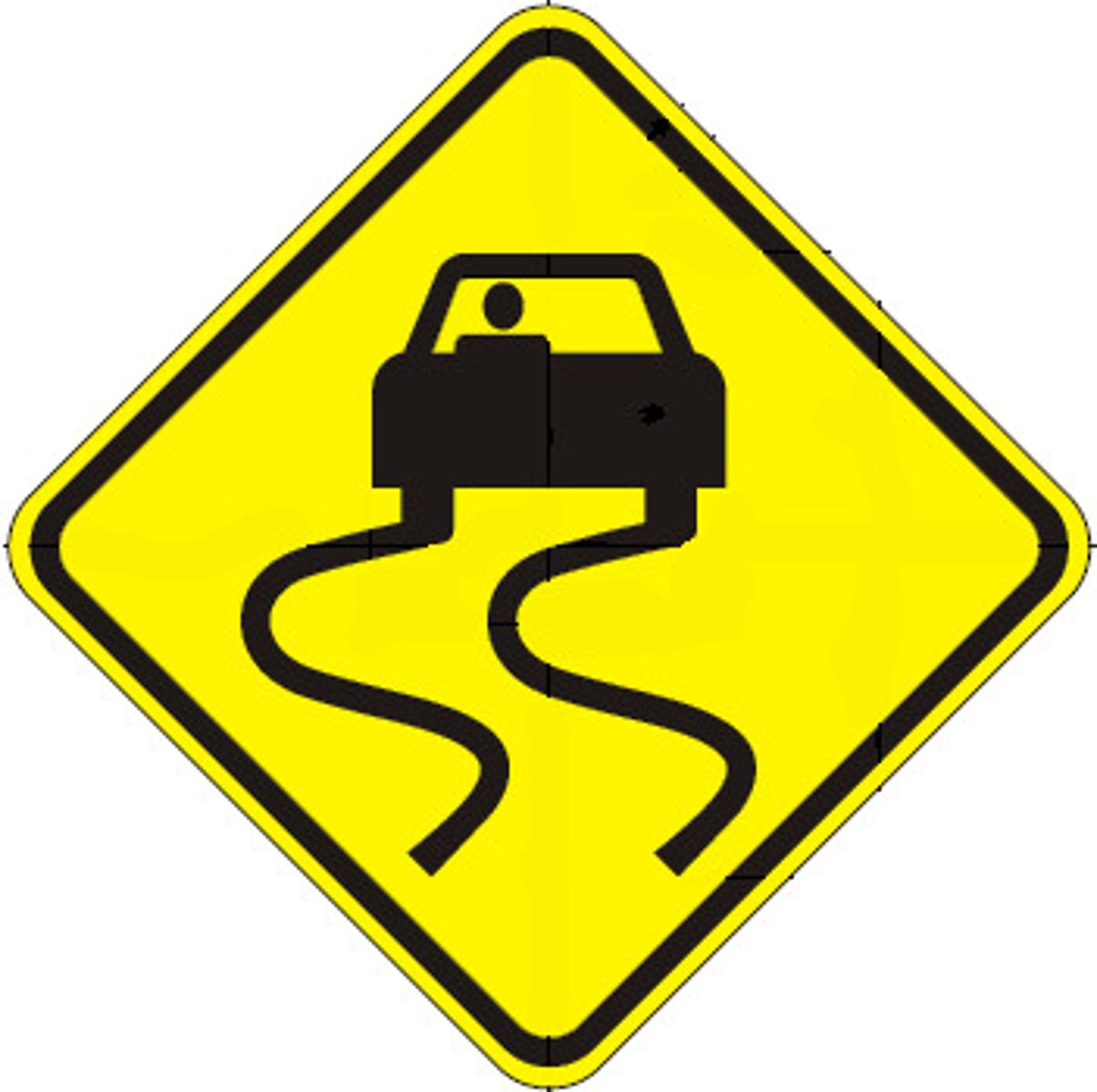
Merging Traffic (Warning Sign - Yellow Diamond)
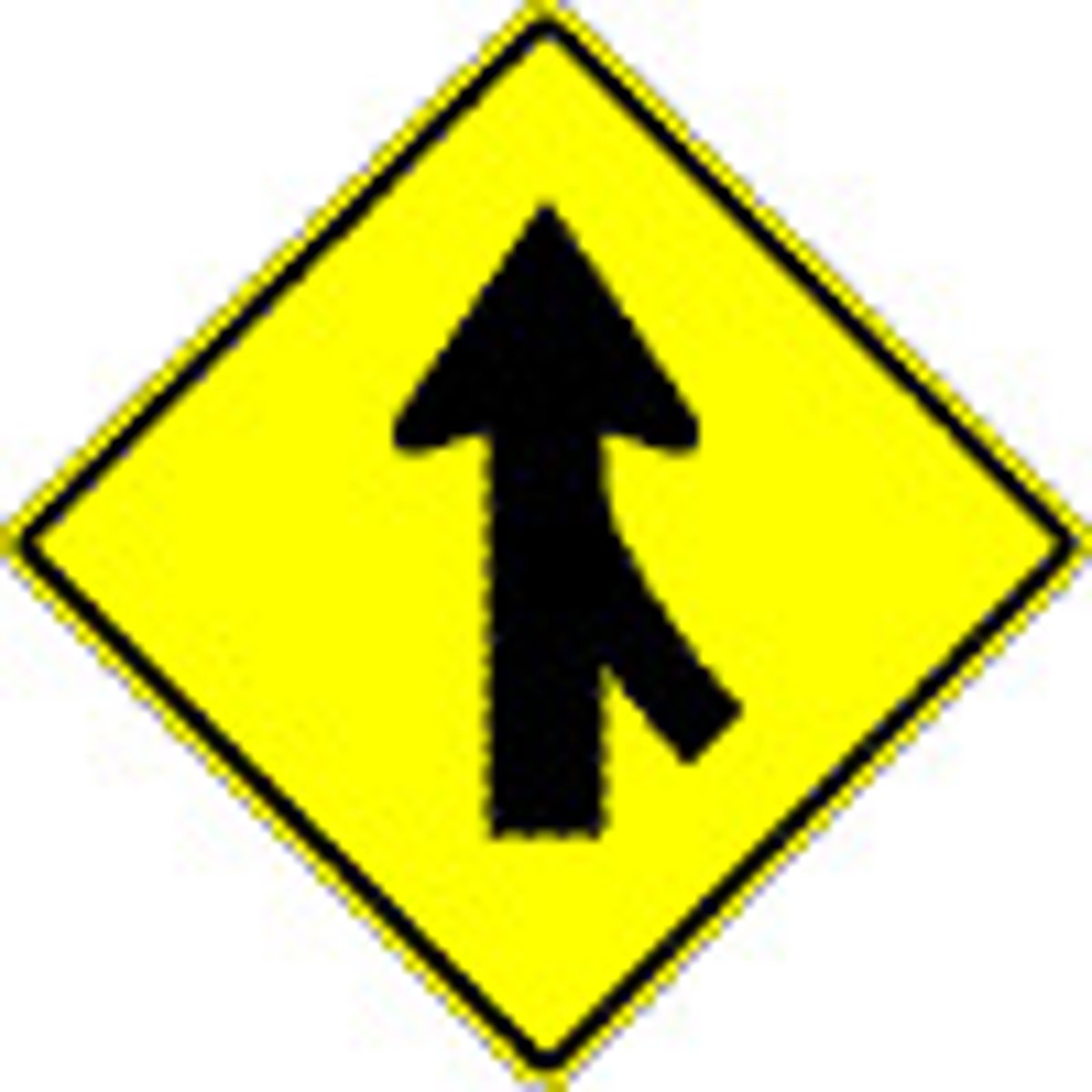
Divided Highway (Warning Sign - Yellow Diamond)
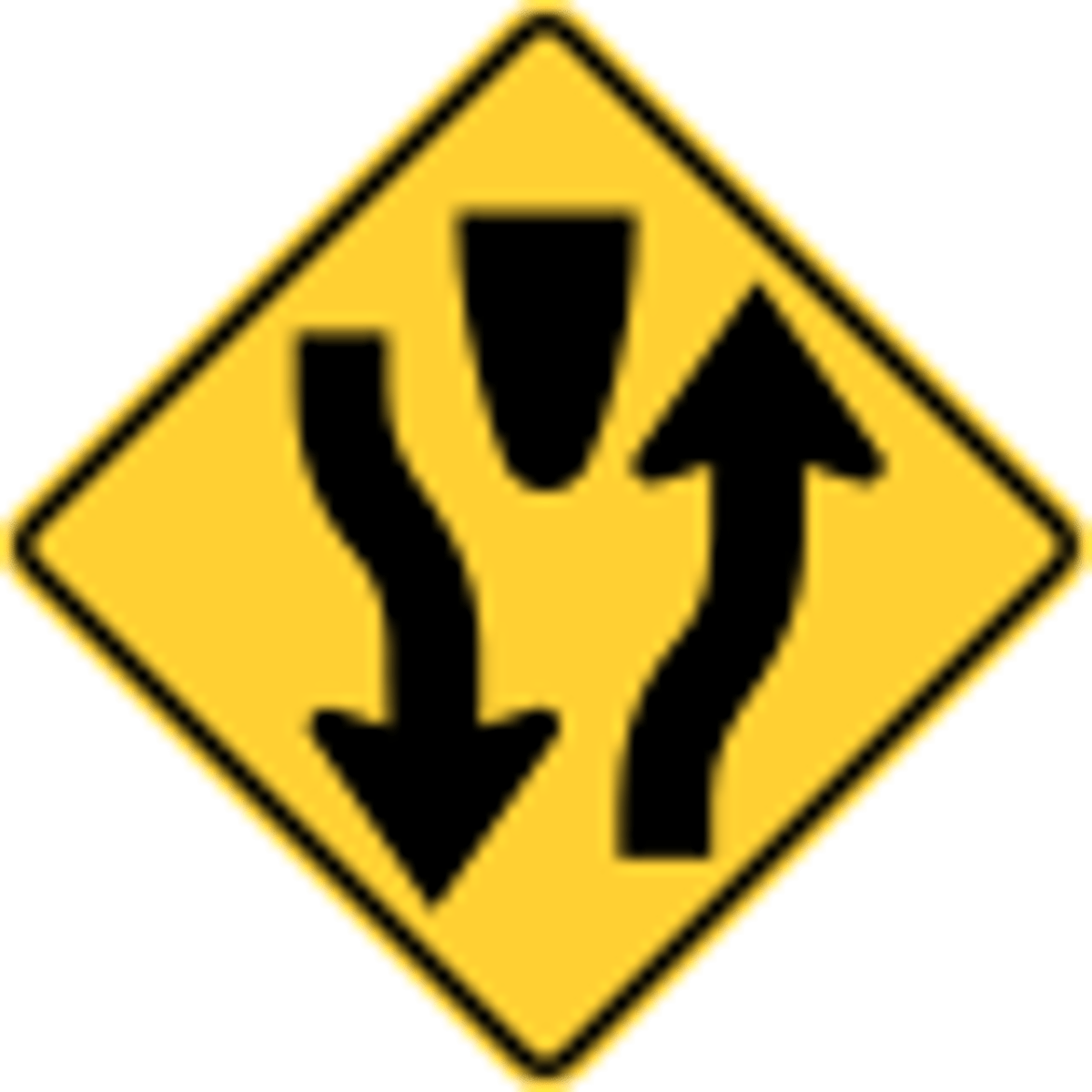
Sharp Turn (Warning Sign - Yellow Diamond)
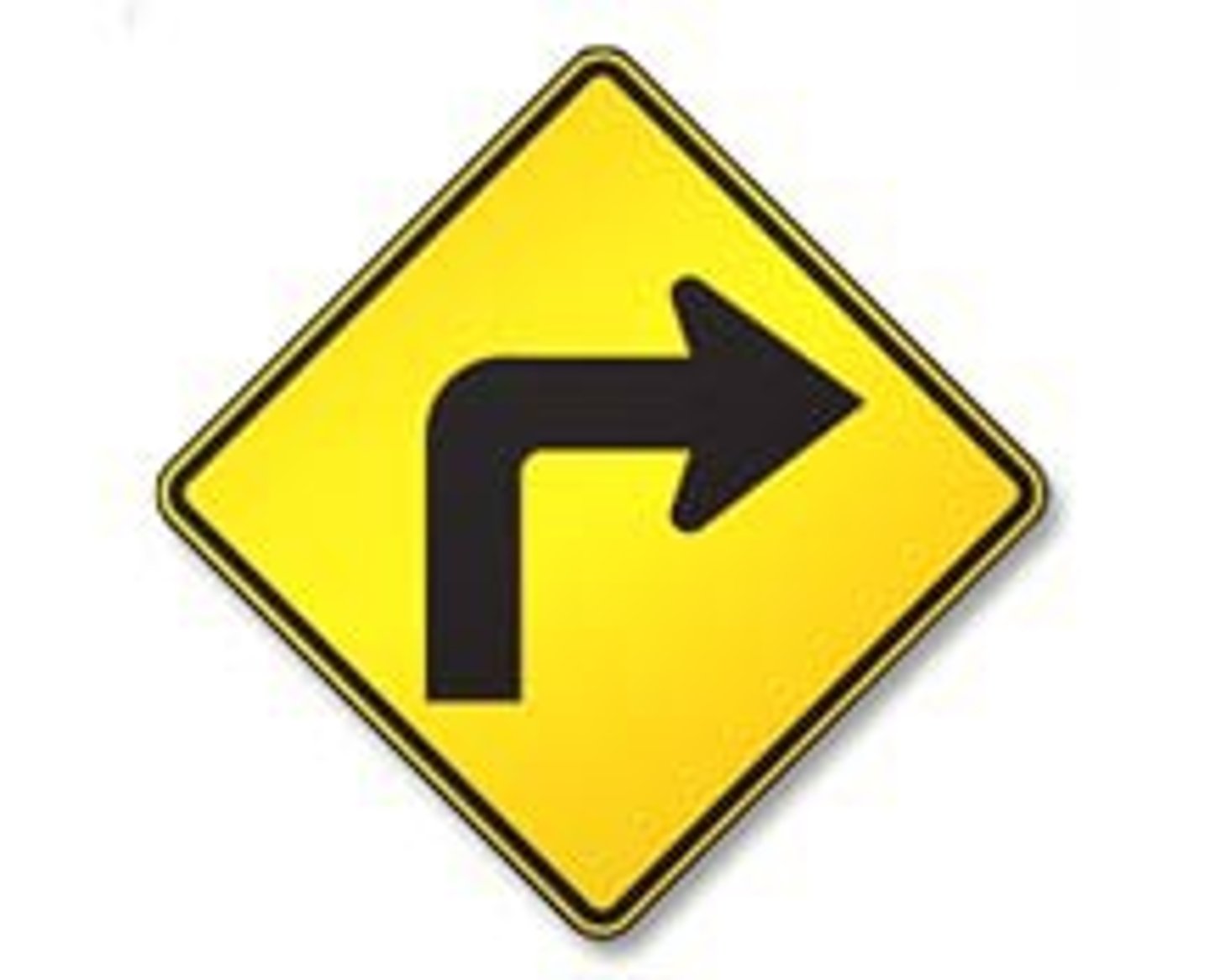
Two Way Traffic (Warning Sign - Yellow Diamond)
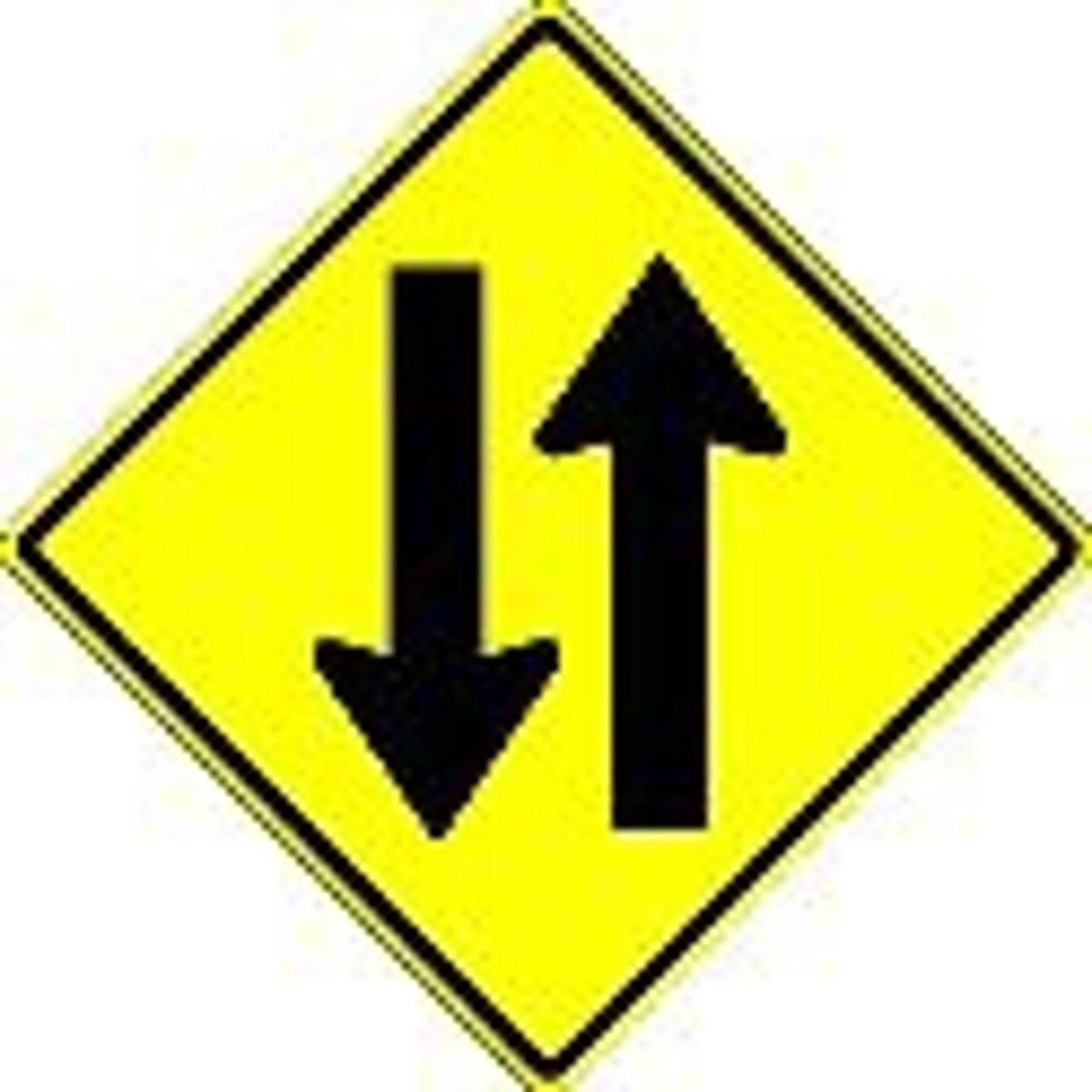
Lane Ends (Warning Sign - Yellow Diamond)
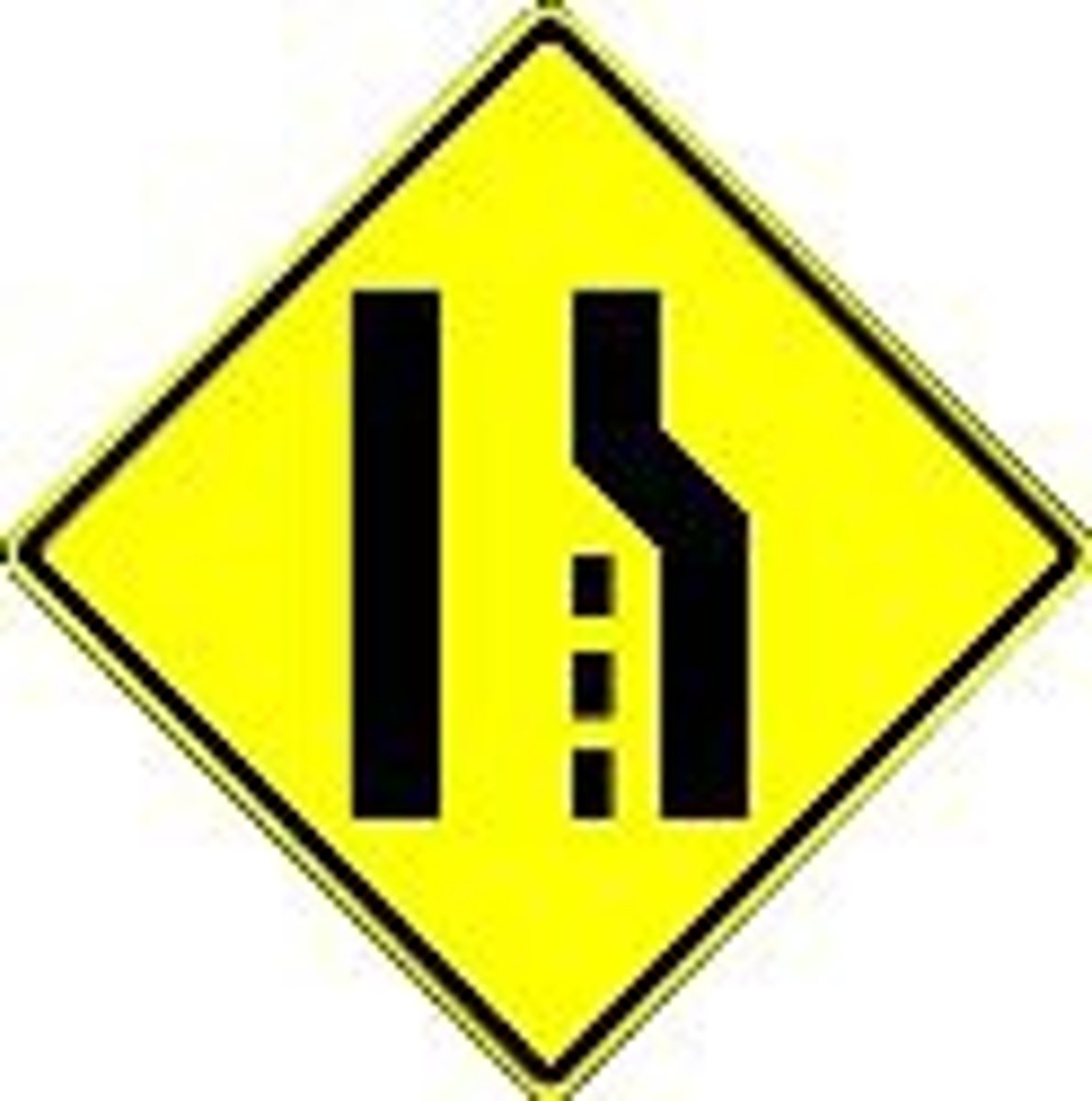
End Divided Highway (Warning Sign - Yellow Diamond)
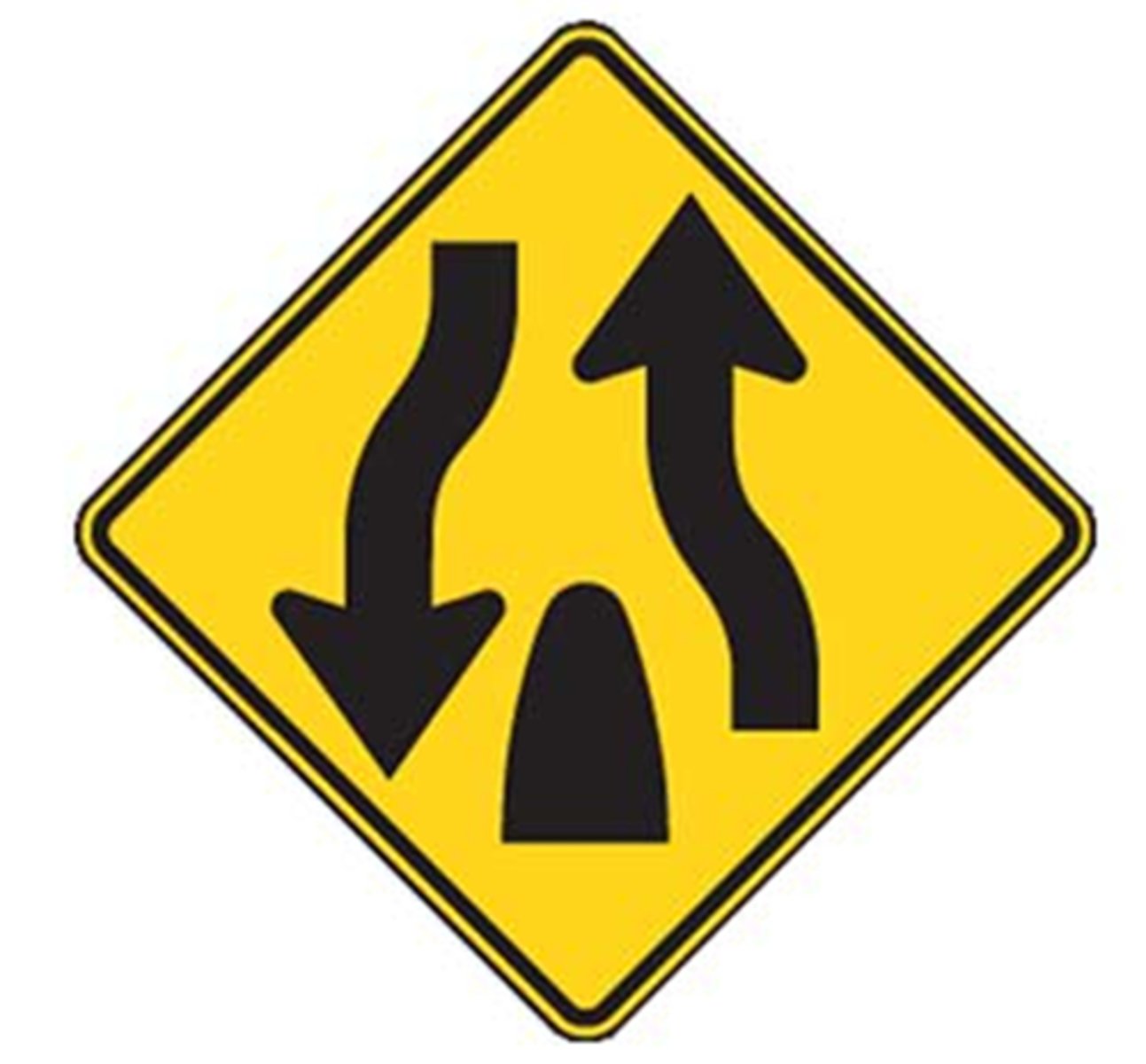
Traffic Signal Ahead (Warning Sign - Yellow Diamond)
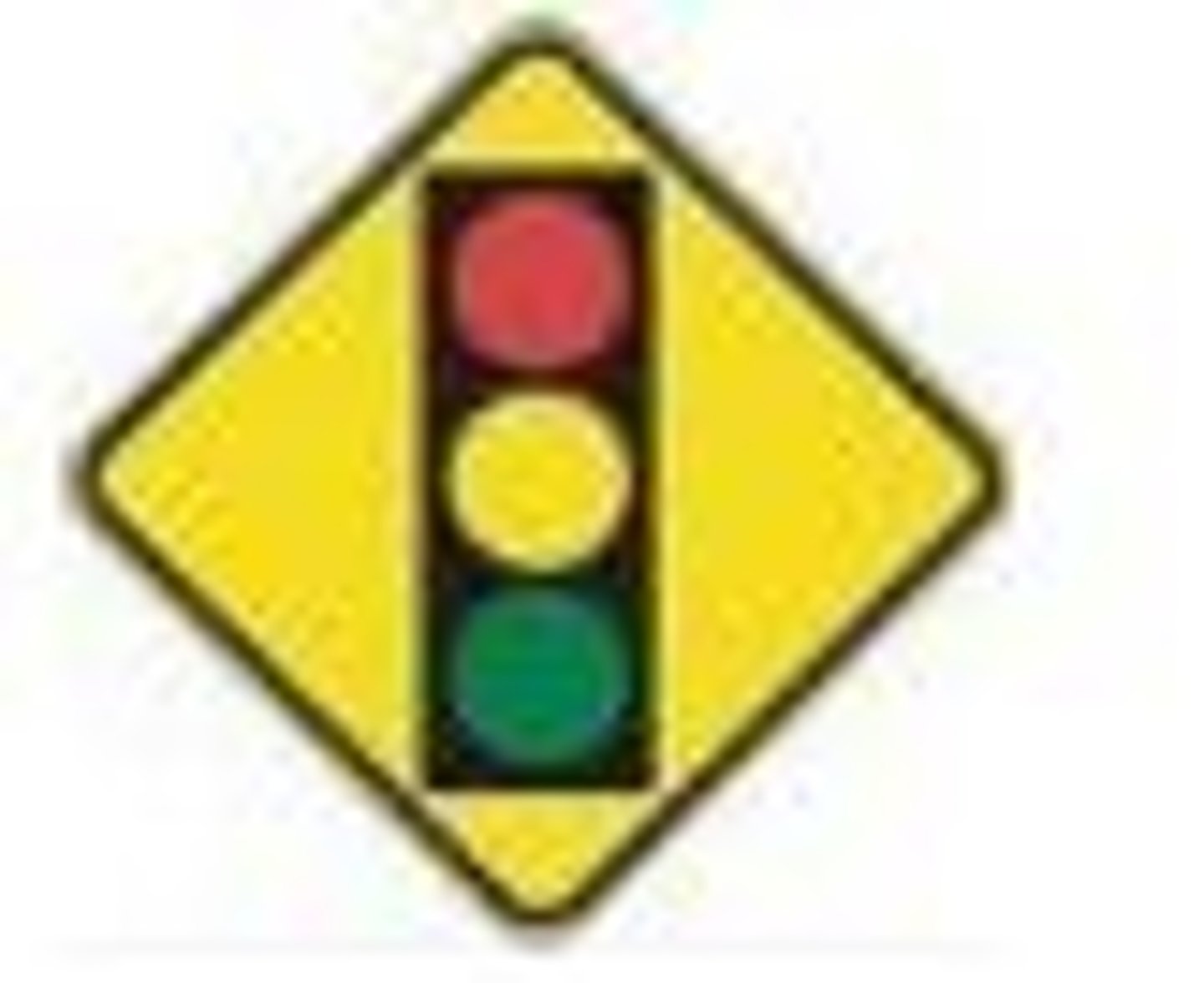
Pedestrian Crossing (Warning Sign - Yellow Diamond)
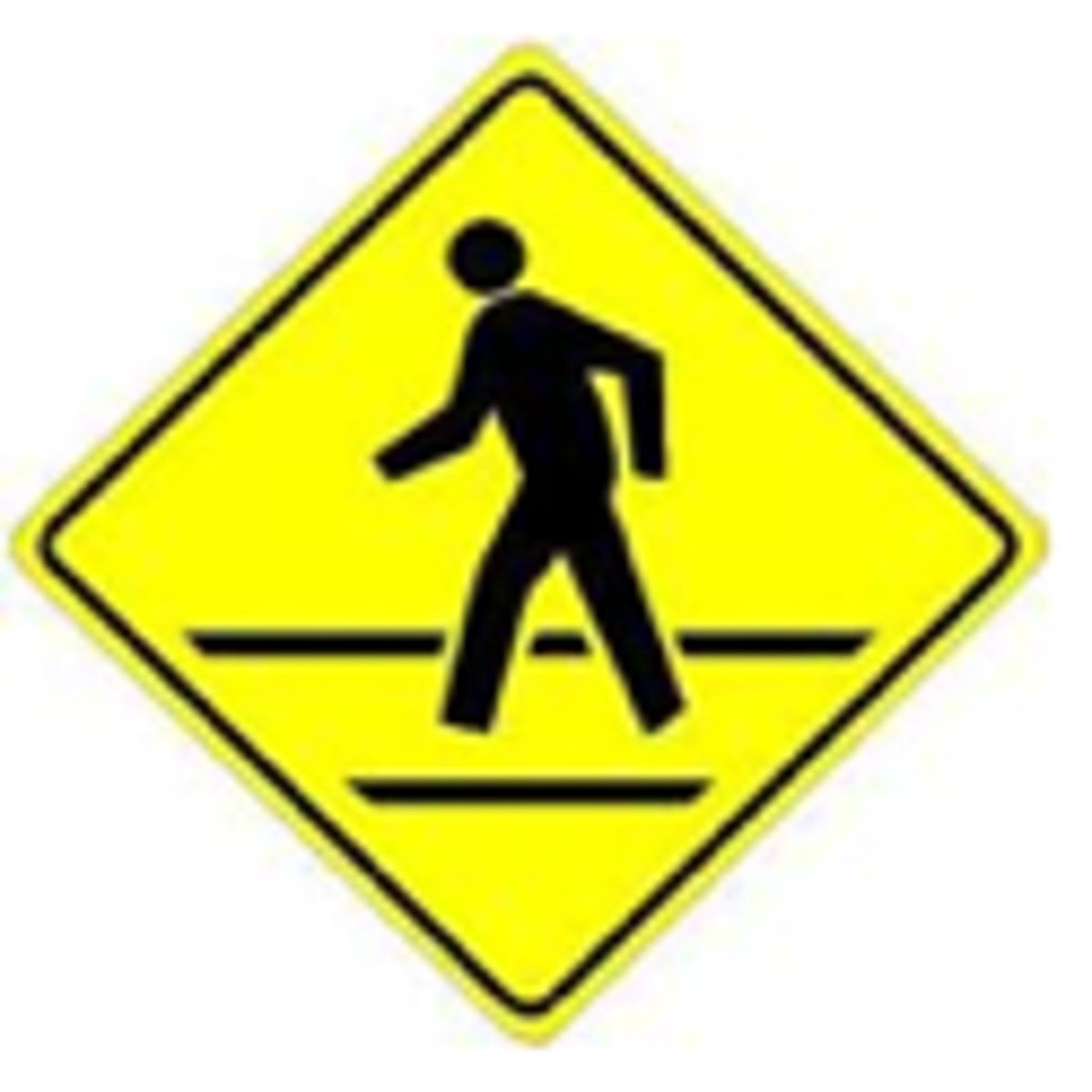
Added Lane (Warning Sign - Yellow Diamond)
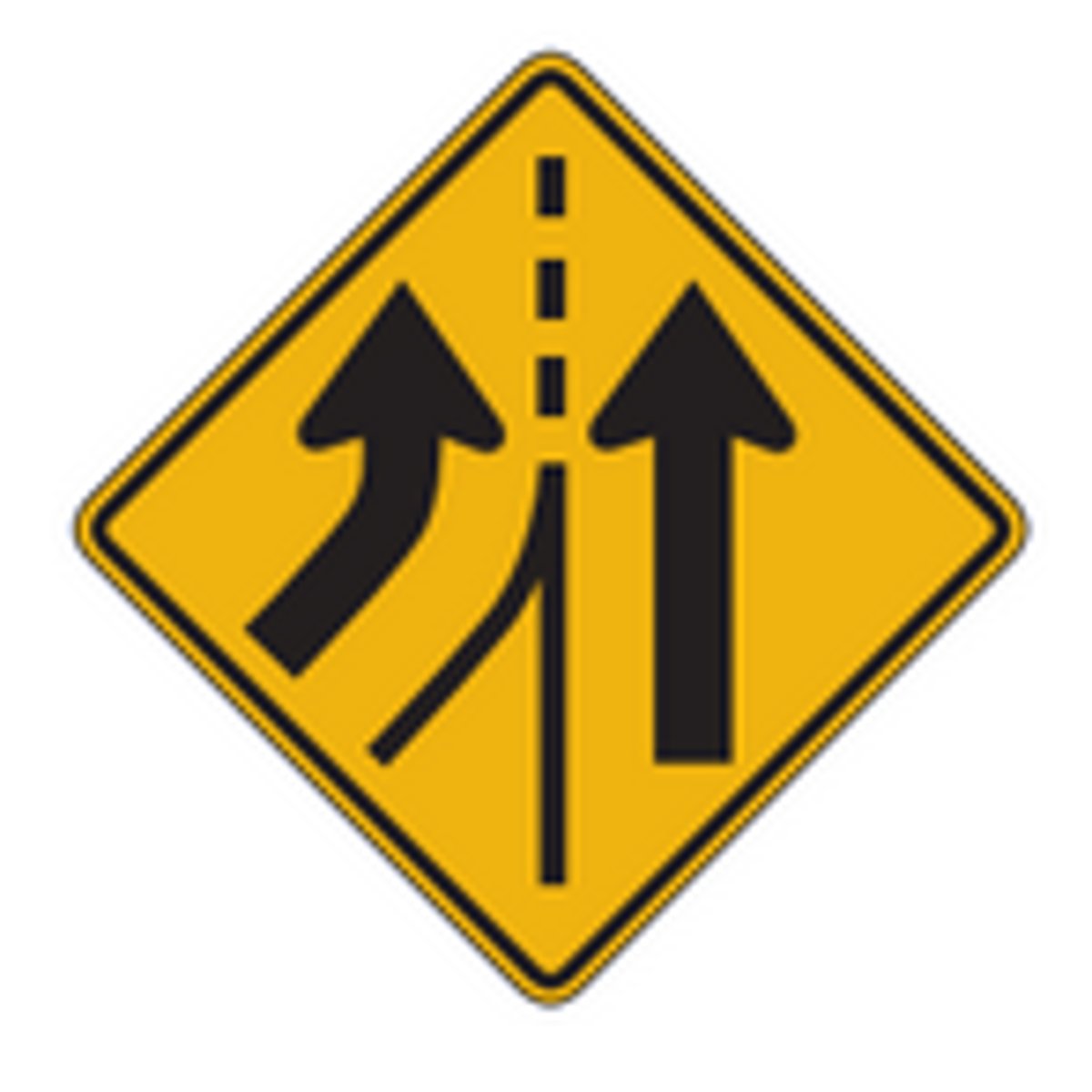
Crossroad (Warning Sign - Yellow Diamond)
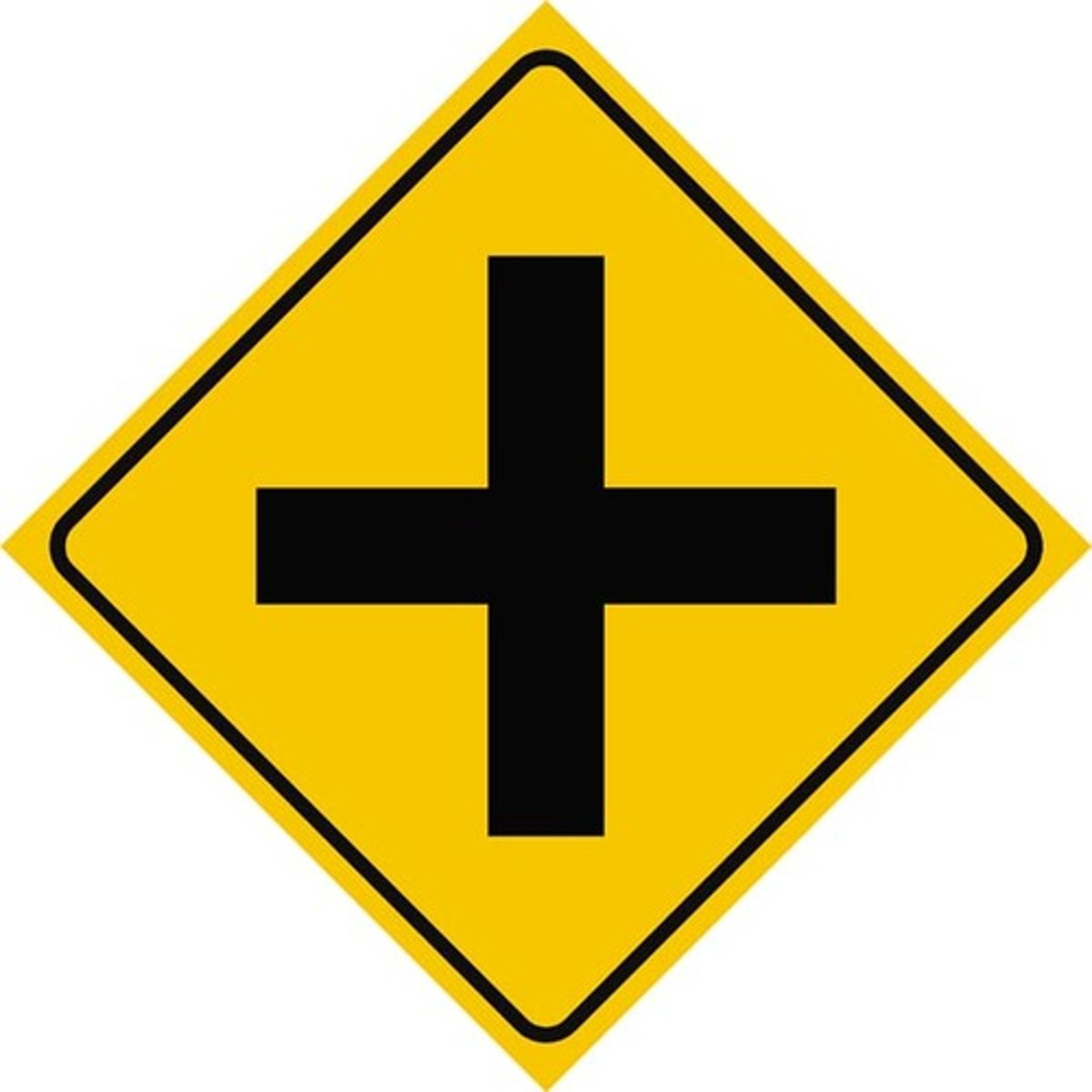
Stop Ahead (Warning Sign - Yellow Diamond)
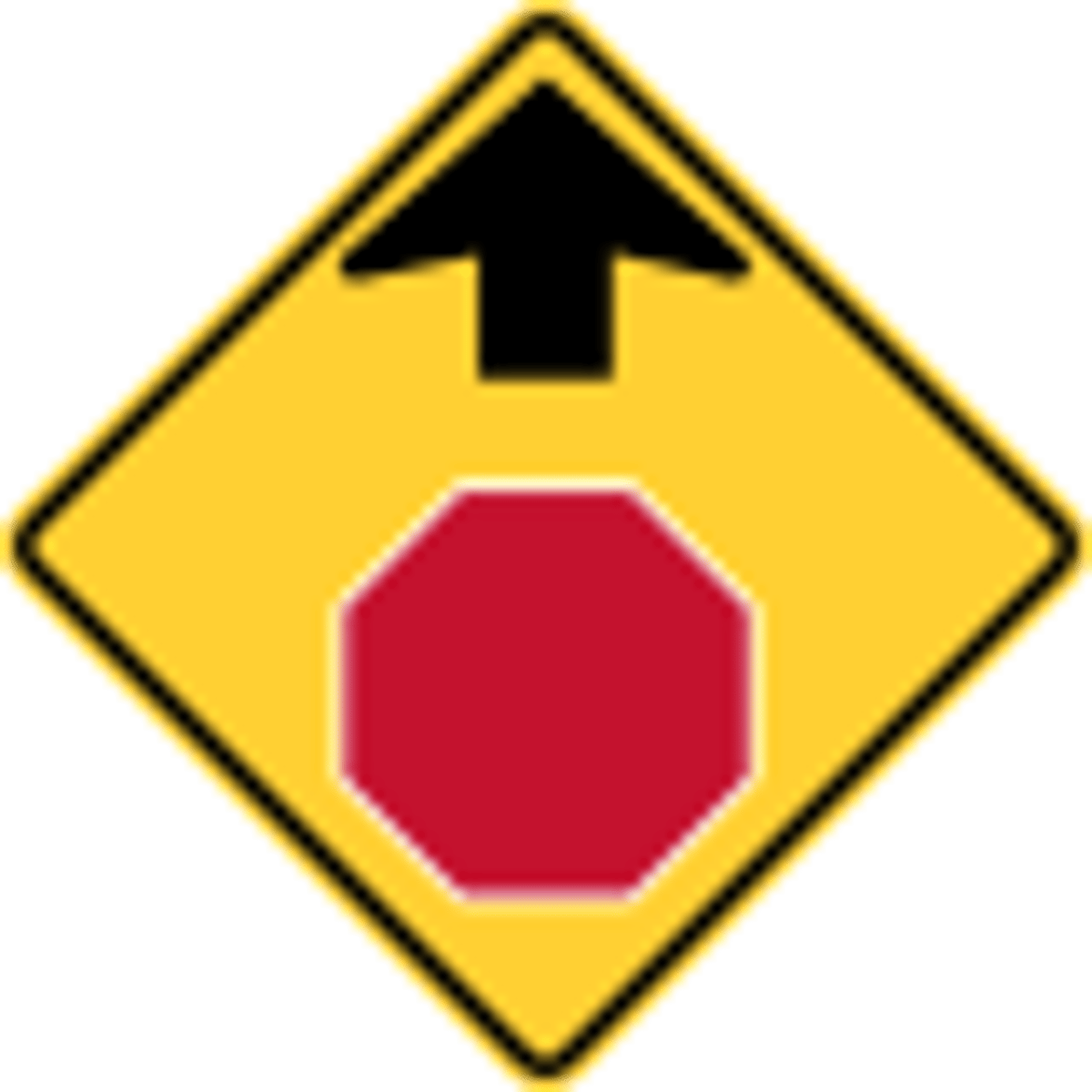
Directional Arrow (Warning Sign - Yellow Diamond)
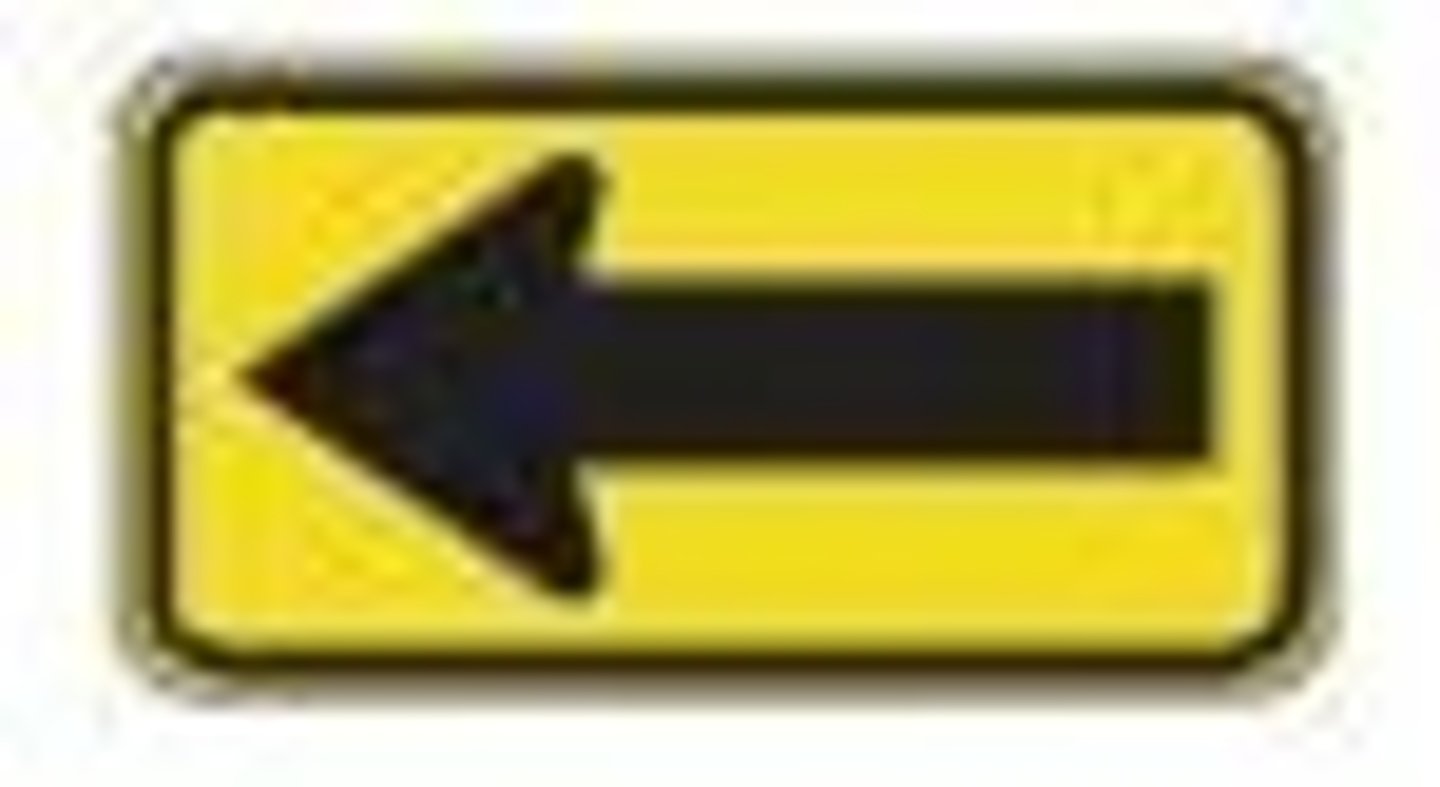
Curve (Warning Sign - Yellow Diamond)
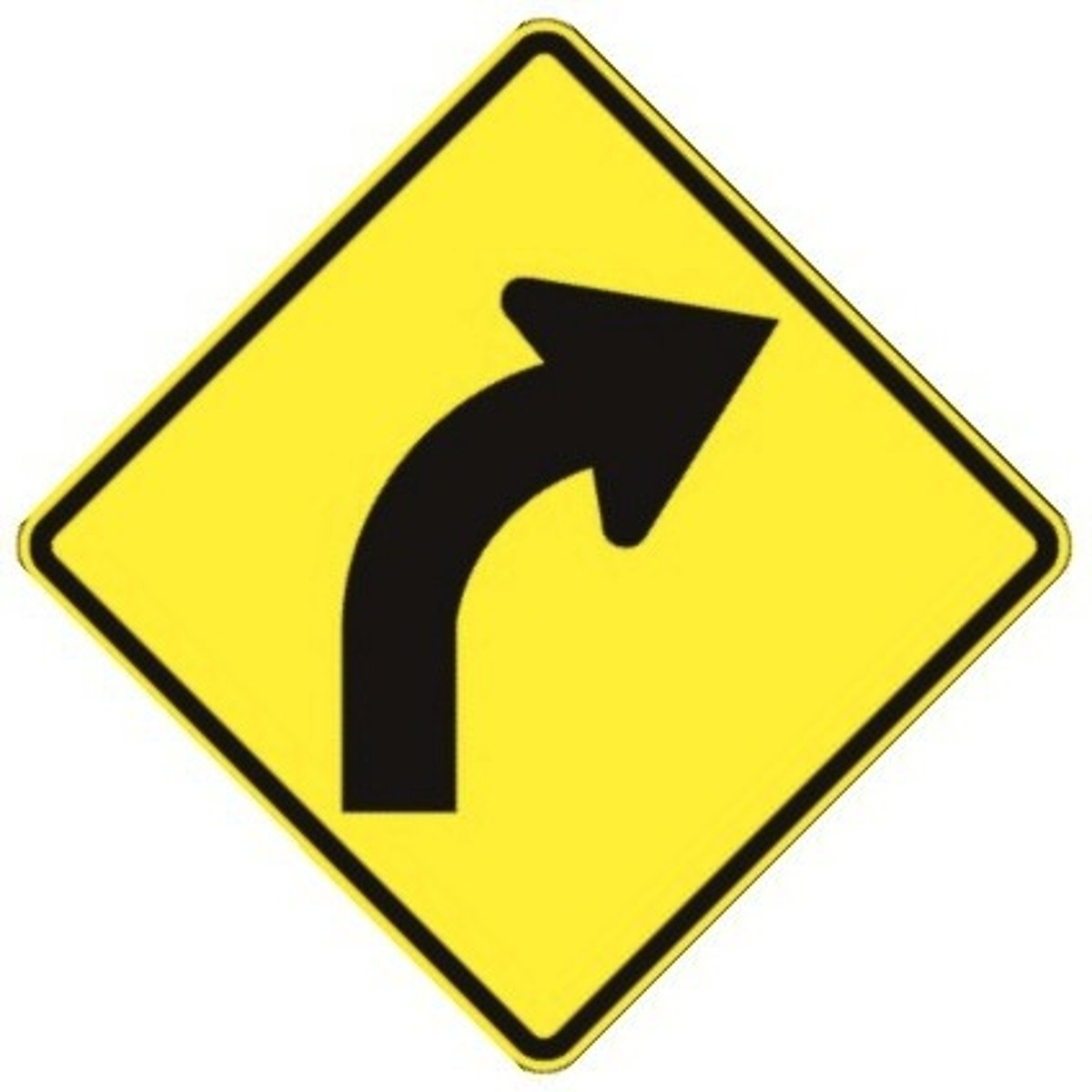
"T" Intersection (Warning Sign - Yellow Diamond)
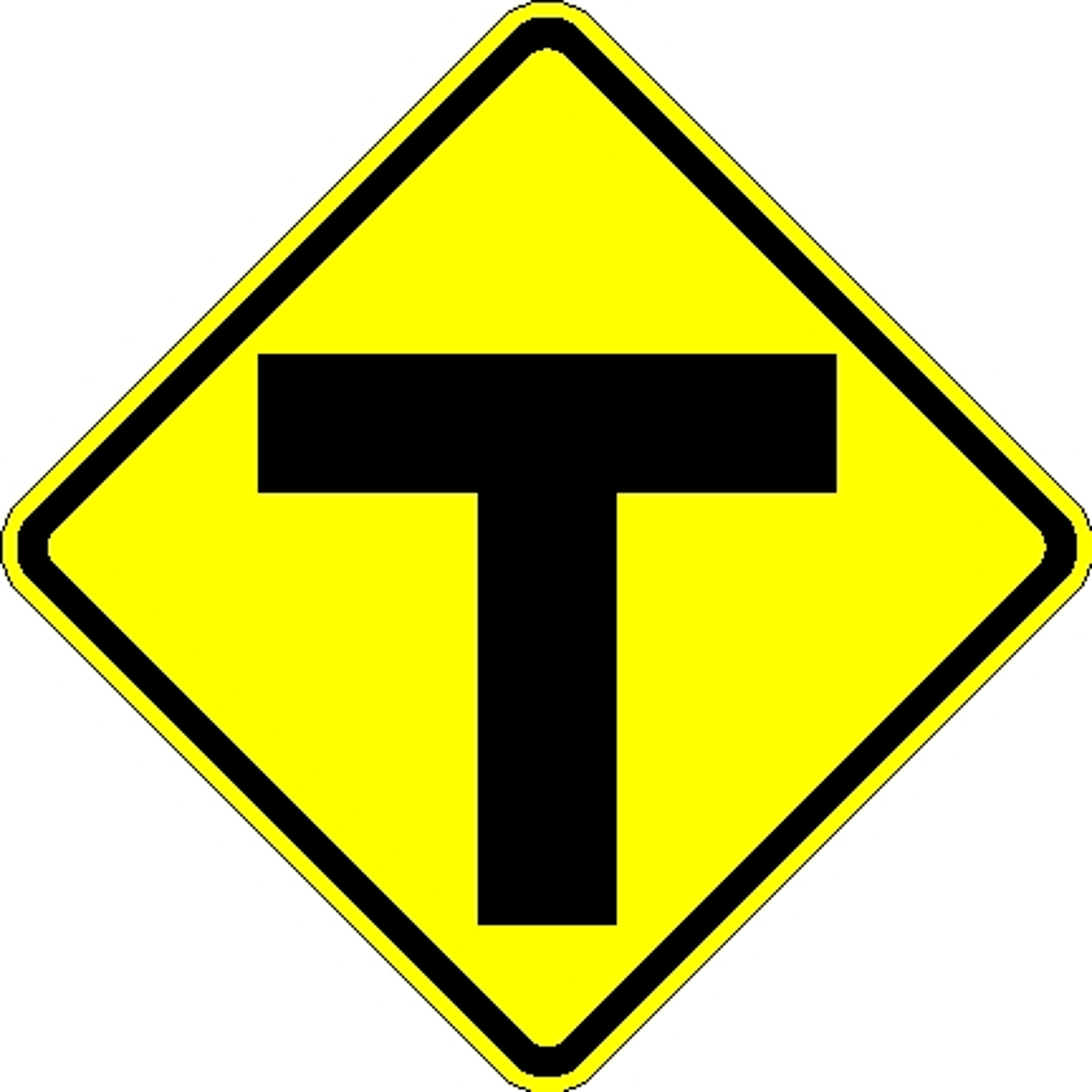
Winding Road (Warning Sign - Yellow Diamond)
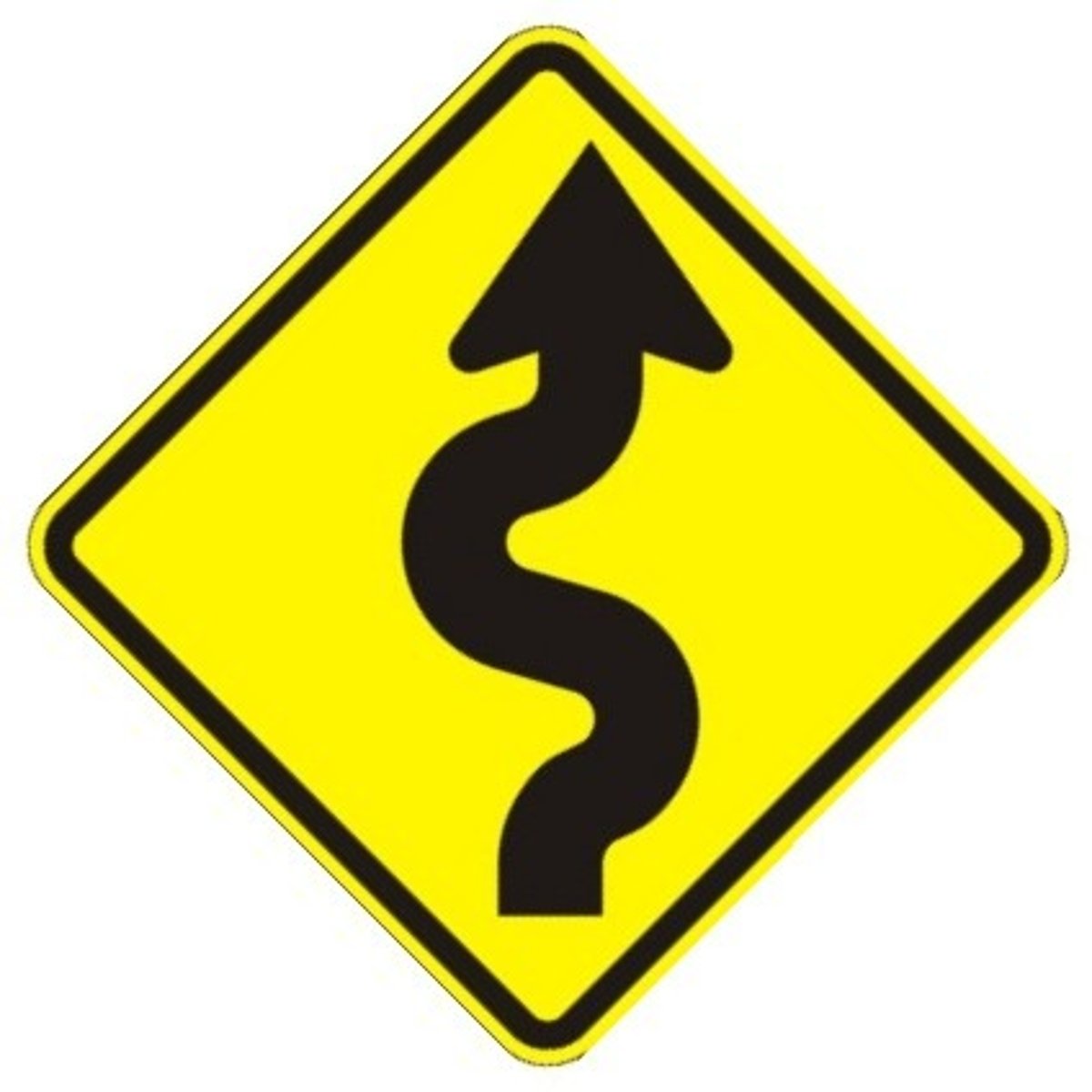
Slow Moving Vehicle Sign (Orange Triangle, Edges Removed)
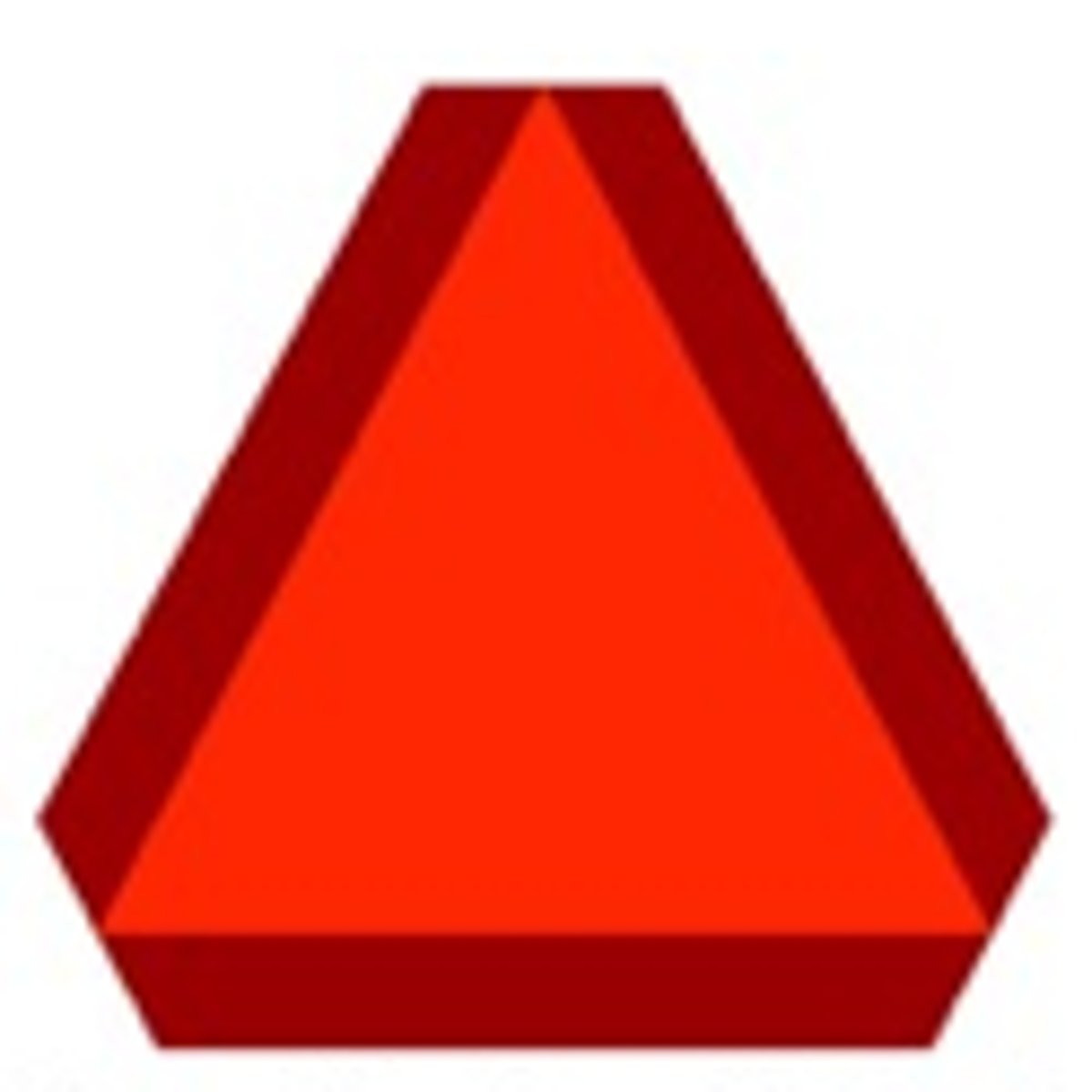
Yield (Traffic Sign)
Means "Slow Down and Be Ready to Stop" Yielding to vehicle, pedestrian, and bicyclist
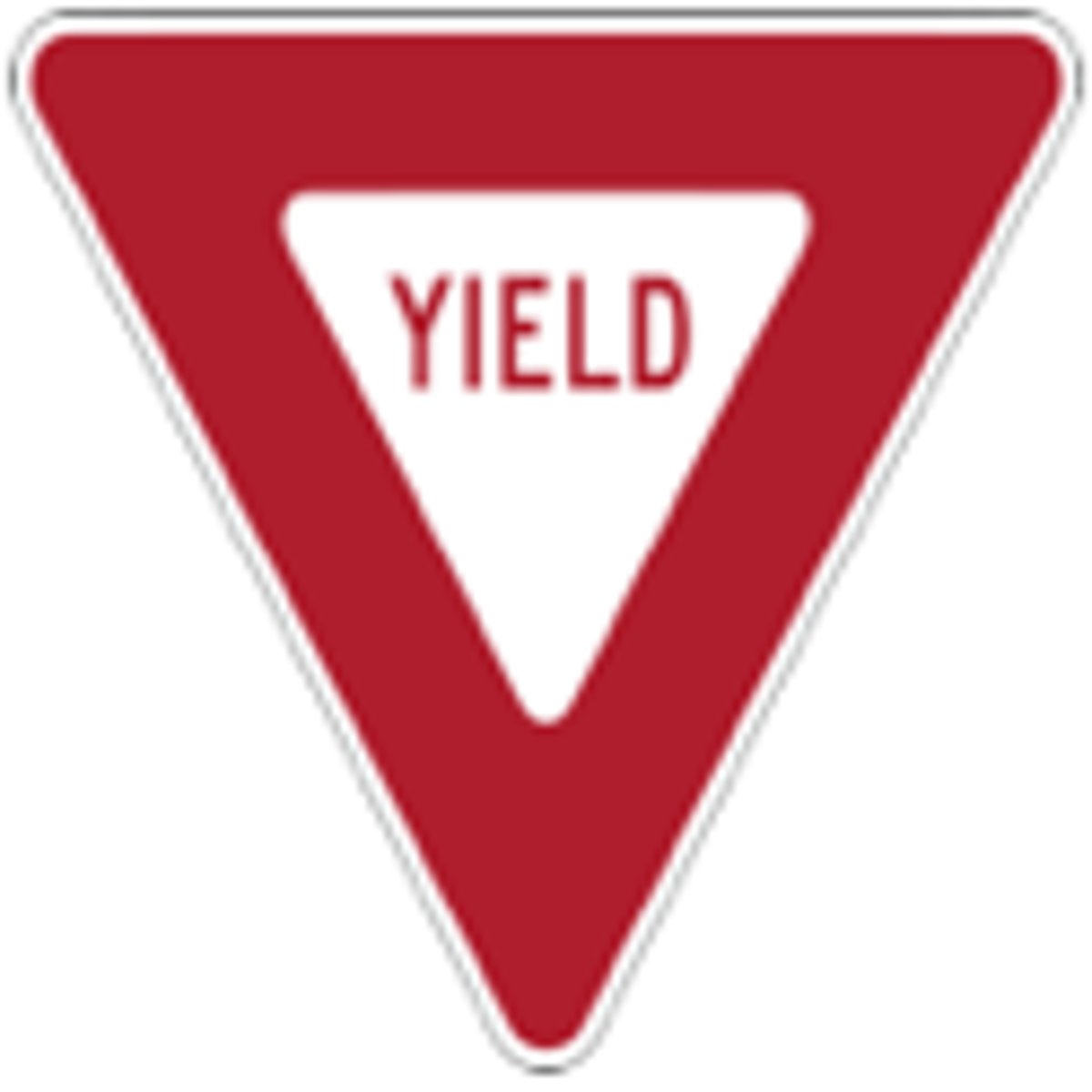
Do Not Enter (Traffic Sign)
Follow sign Instruction
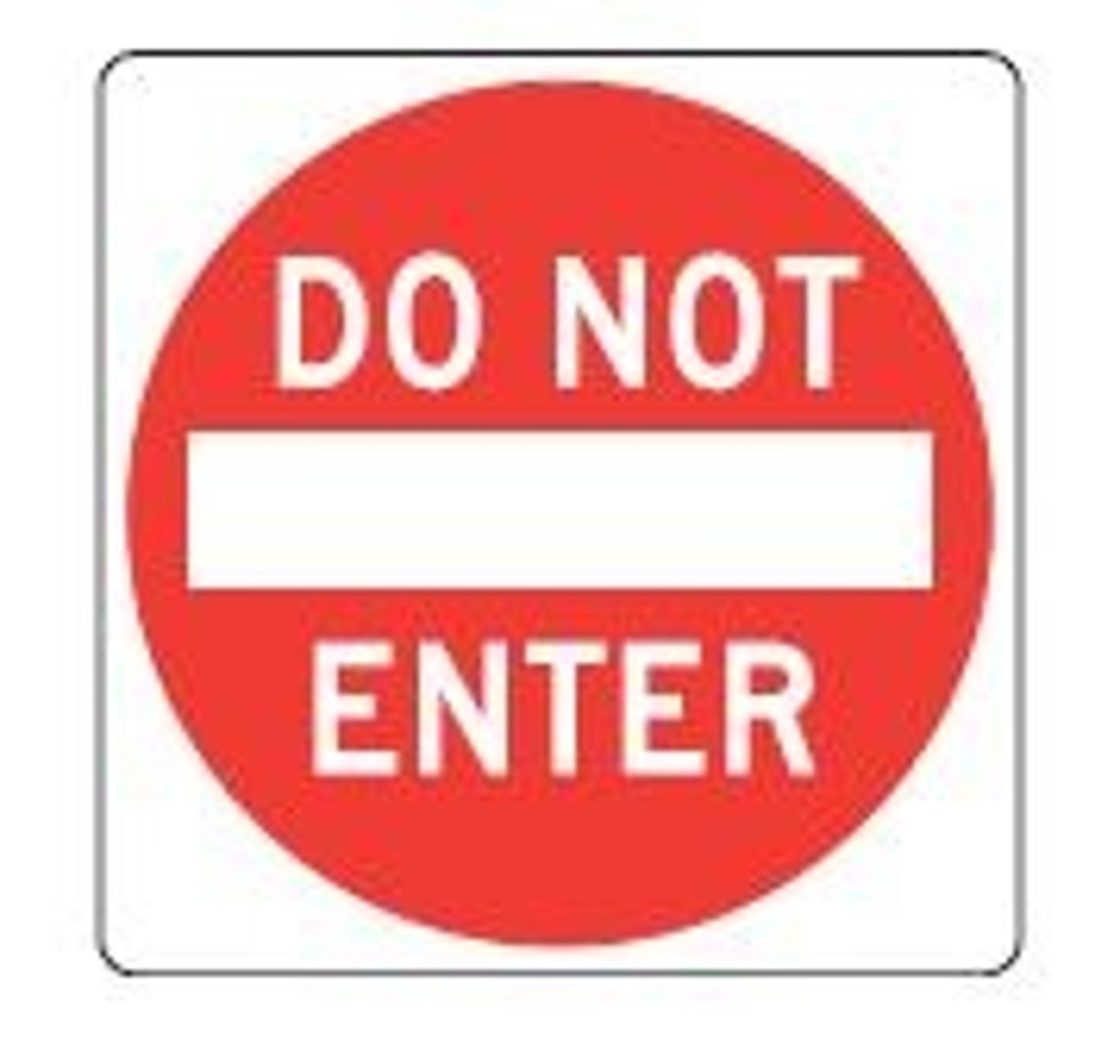
Do Not - Red Circle and Diagonal Line (Traffic Sign)
Red and White Regulatory Signs. Follow sign Instruction.
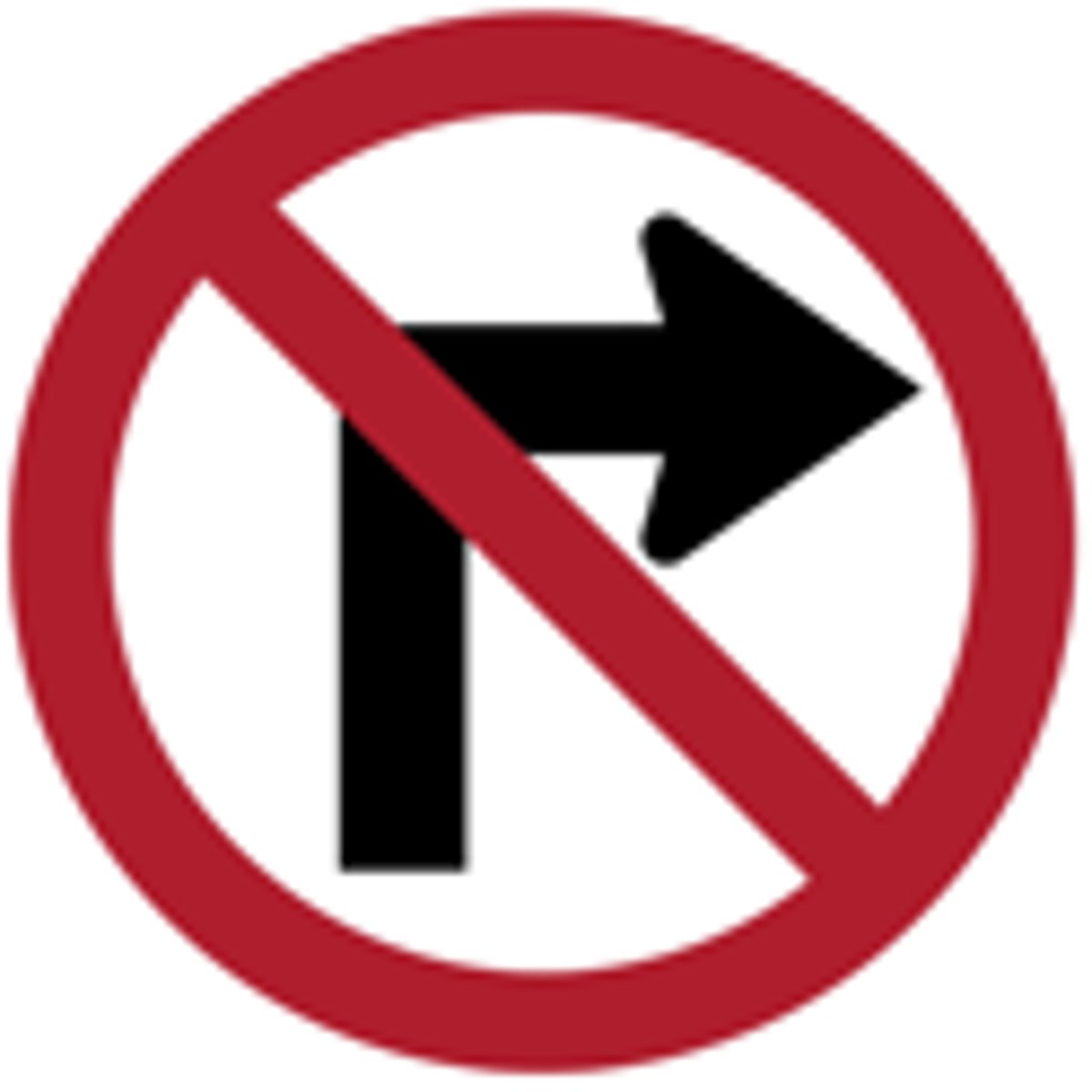
Approaching Railroad Crossing (Traffic Sign)
Yellow and Black Circle Sign. Means "Approaching Railroad Crossing"
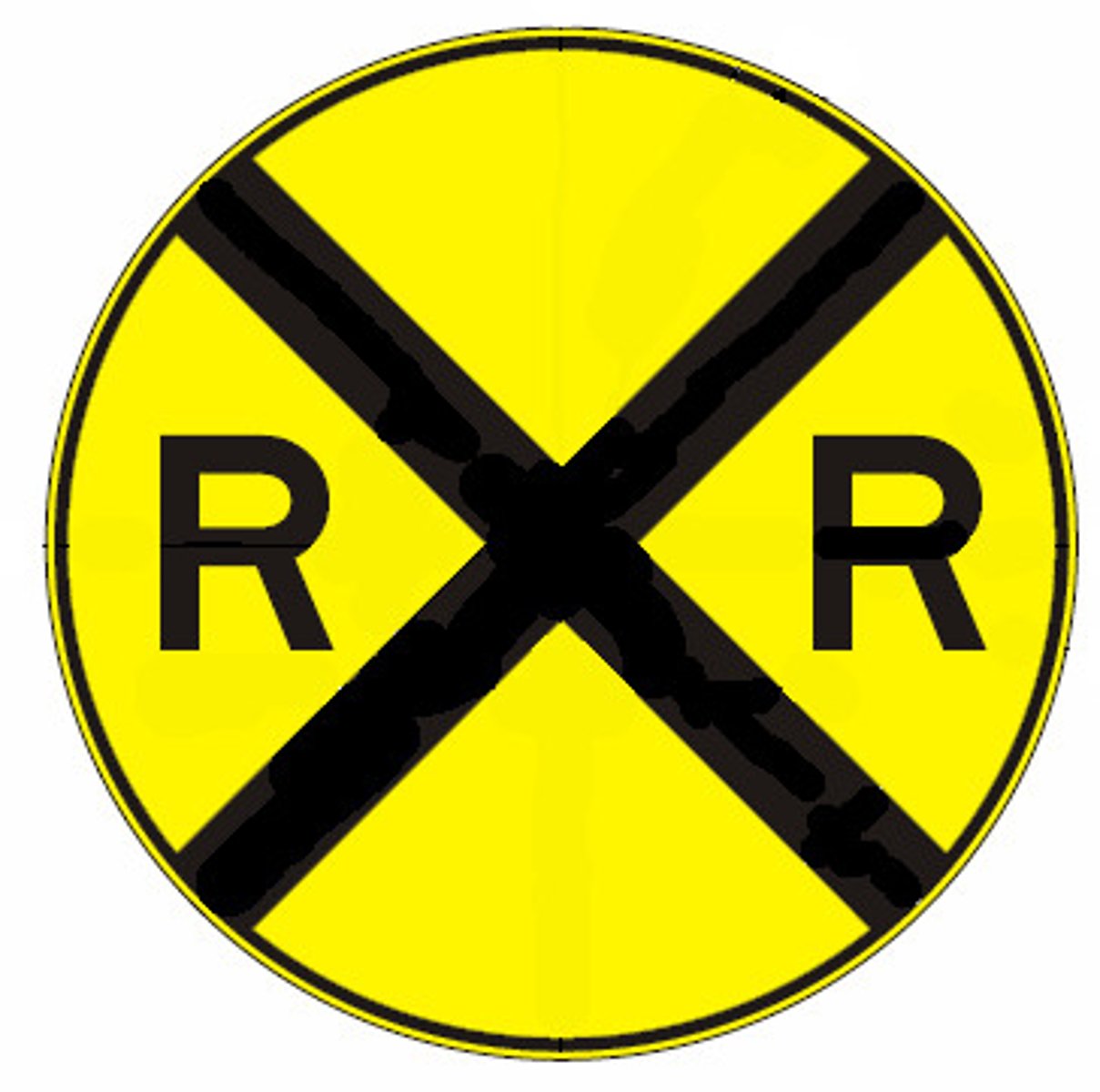
Railroad Crossing (Traffic Sign)
Indicates to "Look, listen, slow down, and prepare to stop"

Near a School (Traffic Sign)
5-sided sign indicating "To Be Cautious and Stop when Children Are Crossing
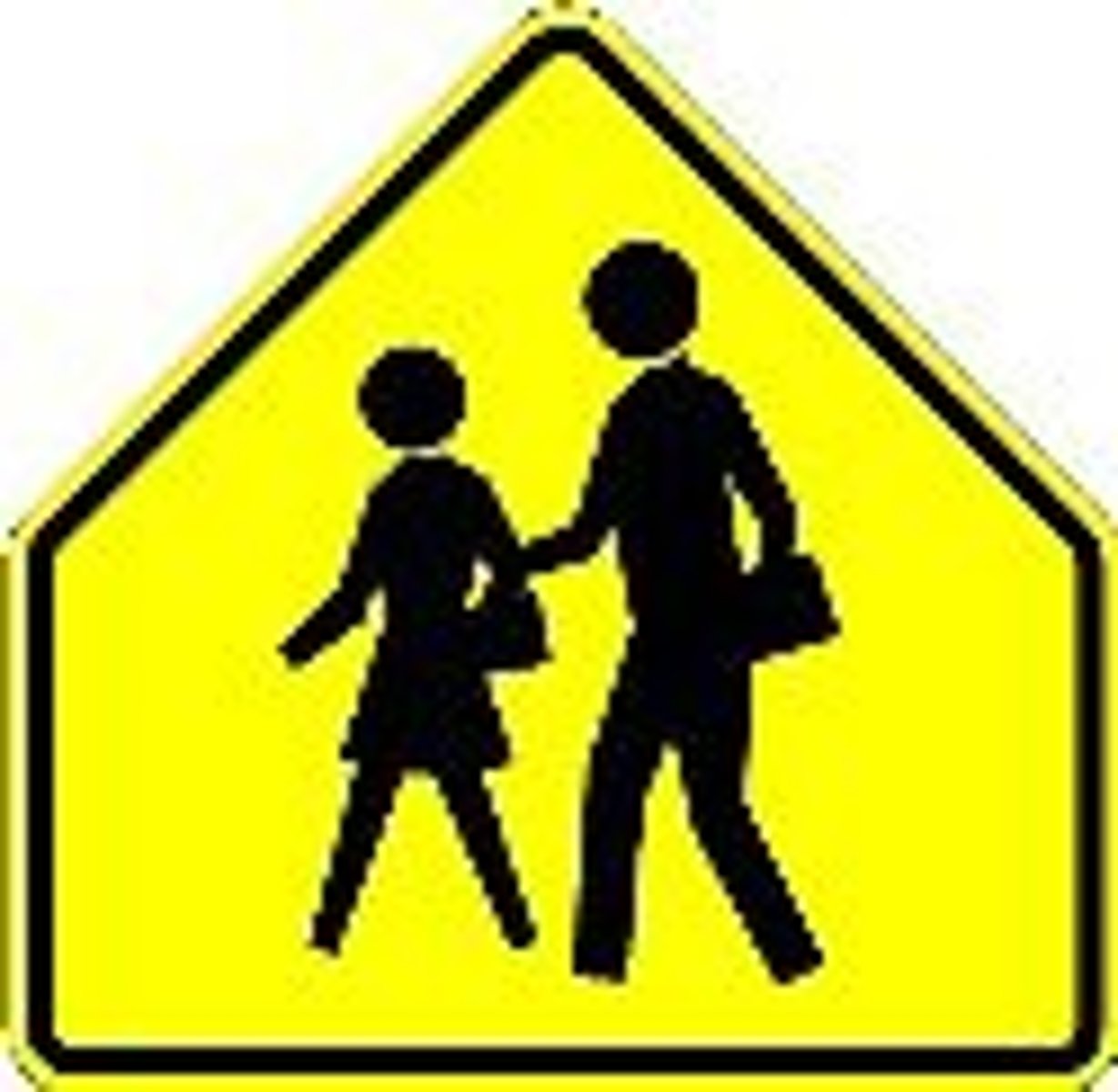
White Regulatory Signs
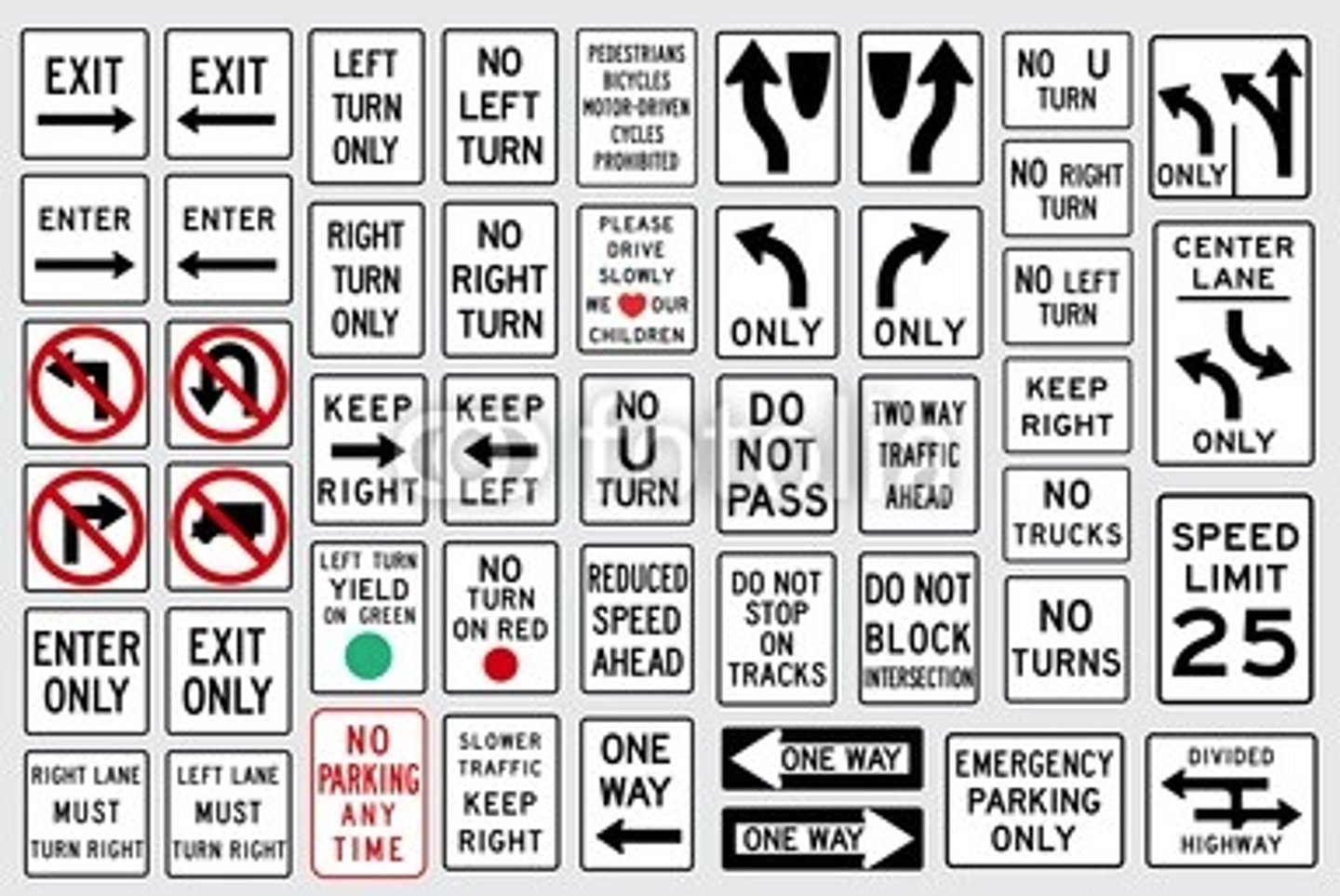
Highway Construction and Maintenance Signs
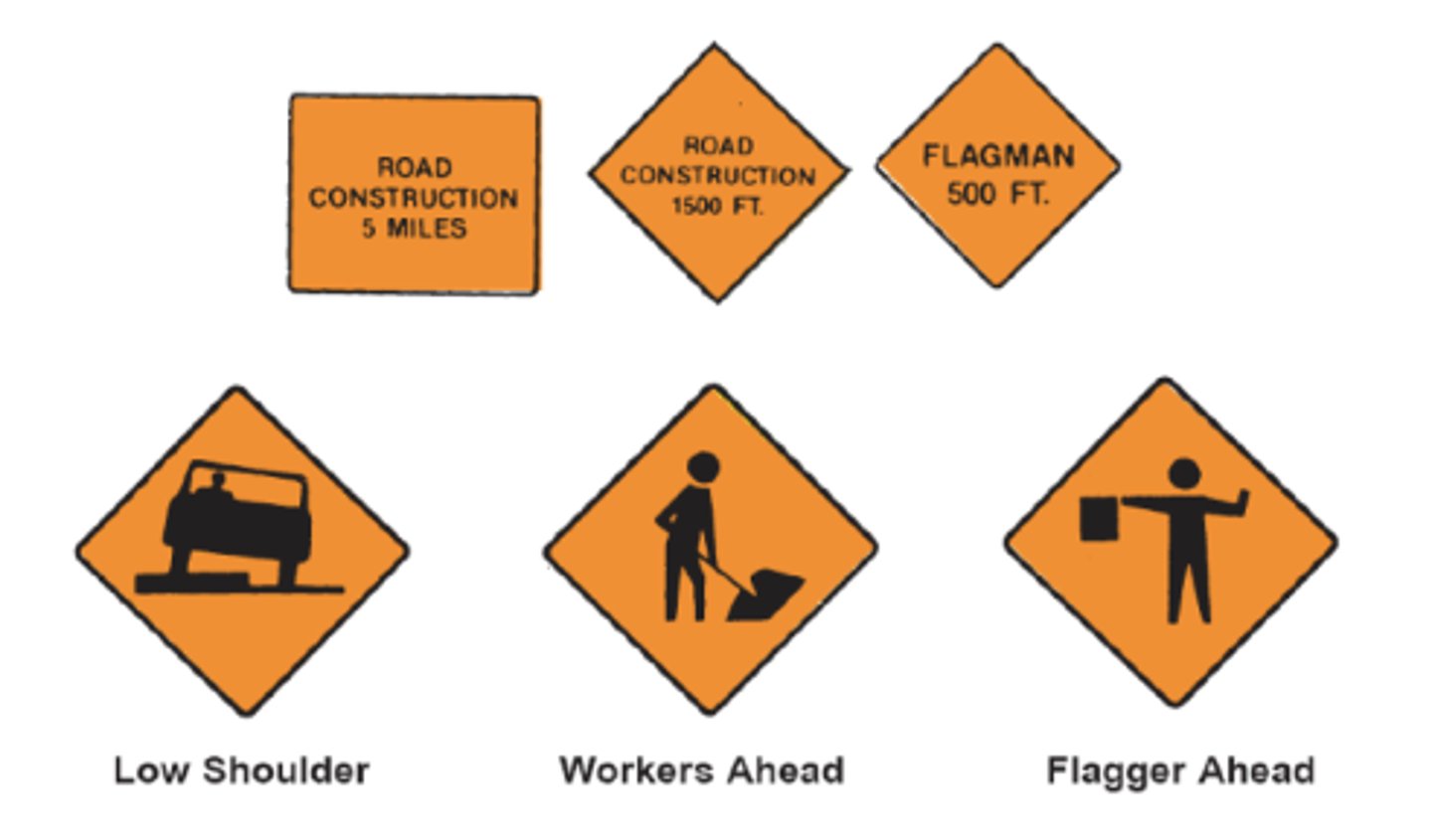
Guide Signs
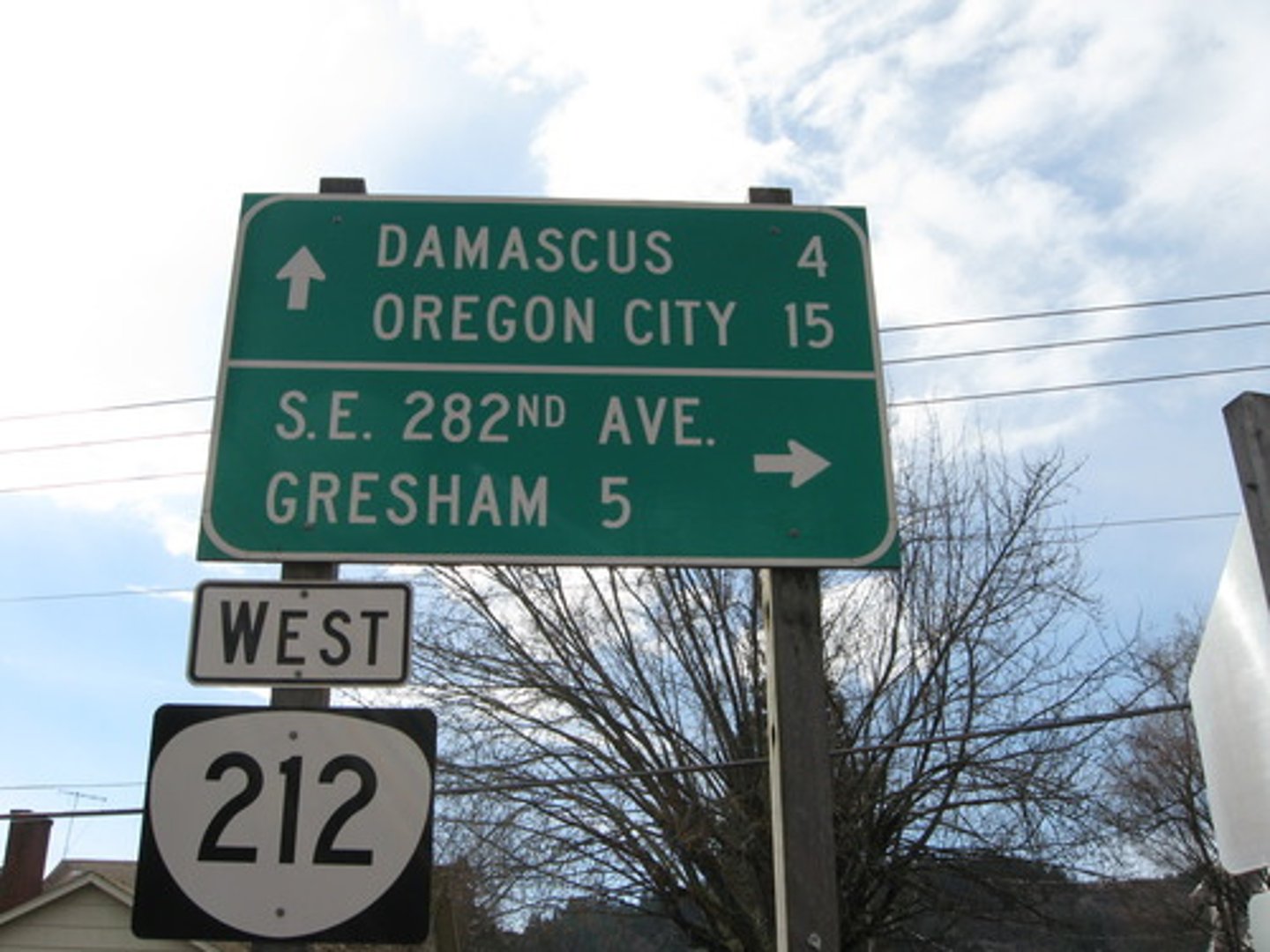
Hazardous Loads Placards

Pedestrians (Right-of-Way Rules, 4)
-Always stop for pedestrians crossing at corners/crosswalks with sufficient time
-Do not pass vehicle stopped at a crosswalk
-Do not drive on crosswalks/sidewalks except when entering into driveway or alley
-Obey signs pertaining to pedestrians and
Blind Person (Right-of-Way Rules)
-When the blind person steps away or pulls in cane, it is an indication to GO.
Crosswalks Rules
Are white, yellow (near a school), or nonvisible (residential). Slow down sufficiently and yield.
Intersection (2)
-At intersections ("T" or regular) w/o Yield/Stop signs, "yield/stop" to any vehicle/pedestrian/bicyclist that are crossing/start to cross/arrive at the same time as you
-When turning left, give right-0f-away to vehicles/pedestrians/bicyclist/motorcyclist dangerously close.
Intersections - Safety Tips (4)
-When waiting to turn, keep wheels straight forward
--When turning right, be cautious of bicyclist/pedestrians next to you
-In divided highways, be aware of any vehicles in lanes you cross while turning
-Yield to traffice when leaving parking/parking lot
Roundabouts Rules (4): When approaching:
-Slow down then yield to pedestrians/bicyclists crossing
-Watch for signs that permit/prohibit certain movements
-Enter heading right when there is a large enough gap and drive counter-clockwise direction (not stopping or passing vehicles)
-Using turning signals when switching lanes or exiting roundabout
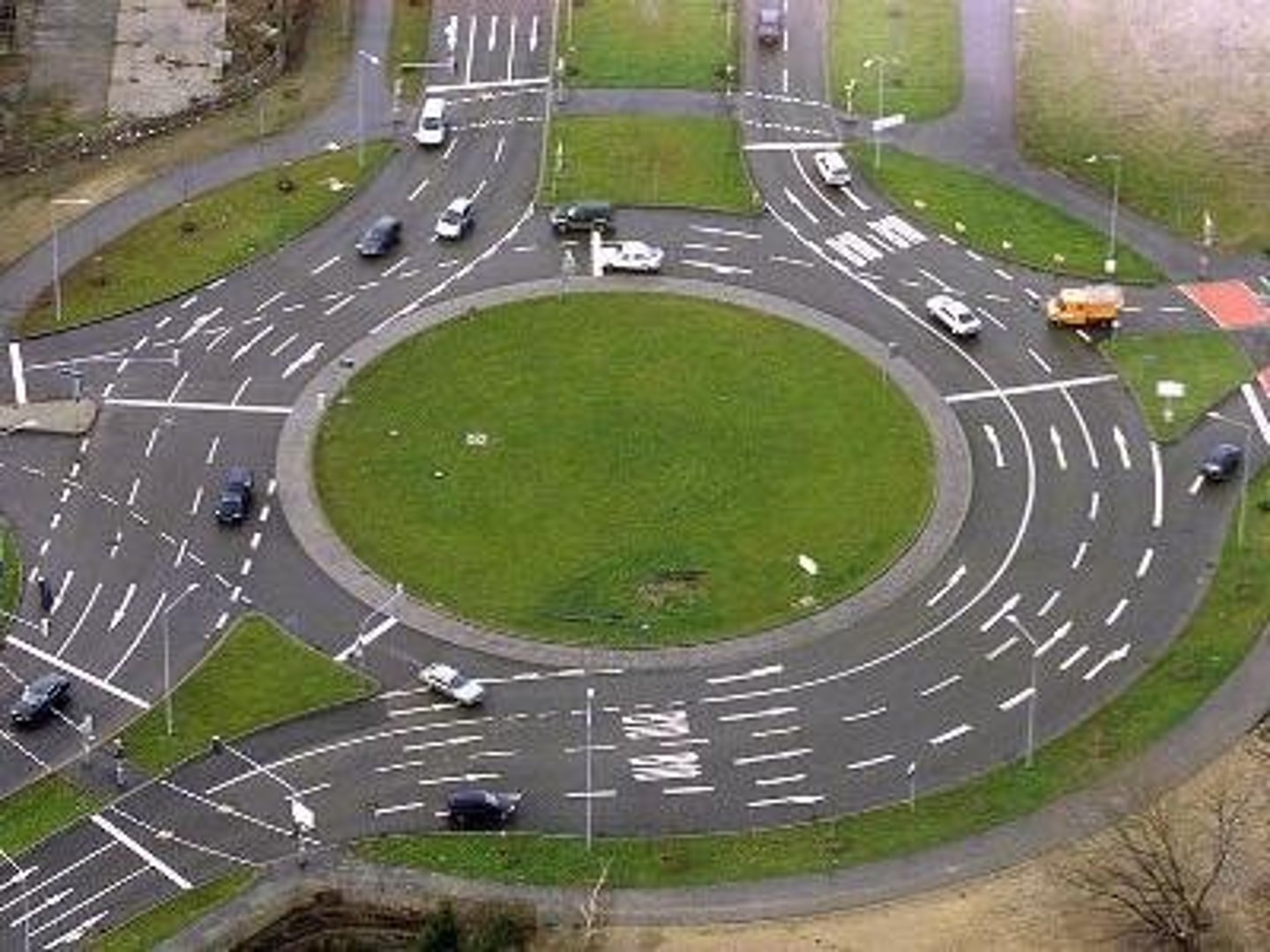
Mountain Roads Rules
When neither vehicles can pass on a steep road, vehicle facing downward must yield and back up till upward vehicle can pass
Basic Speed Law (5)
-Never drive faster than is safe for current tradition
-Number and speed of other vehicles on the road
-Whether road surface is smooth, rough, graveled, wet, dry, wide, or narrow
-Pedestrians/bicyclists near edge of road
-Whether it's raining, foggy, snowing, windy or dusty
Maximum Speed Limit
General speed is 65 mph, drive 70 mph only when posted and two-lane undivided highways are usually 55 mph
Reduced Speeds (3)
-Occurs for towing vehicles, buses, 3 or more axles, or large trucks which should move to the most right lane
-drivers who chose to driver slower must move to the right lane
-school zones are 25 mph or lower
Near Schools look for:
-safety patrols and obey their directions
-School buses depositing children may flash yellow "slow down and prepare to stop" or flash red "Stop". Failing to stop can receive a fine up to $1,000 and 1 year driving privilege suspension.
Blind Intersection
Required 15 mph for an intersection that is not visible in 100 feet in any direction and has no stop sign.
Near Railroad/Light Rail Tracks (2):
If not visible in 400 ft in both direction approach at 15 mph, and faster than 15 mph if it's controlled by warnings (stop at 15-50 ft if warned)
-Look and listen in both directions before safely proceeding
Near Streetcars/Trolleys/Buses:
Safely pass at 10 mph at a safety zone (raised button/markers)/intersection when these vehicles are stopped or being directed by lights/peace officer
Speed Limit at Business or Residential Districts
25 mph unless otherwise posted
Actions to Take When Near Animals include (2):
-Slowing down if animal or livestock are near road unless directed by the keepers
-Slow down or stop if a stray animal in path
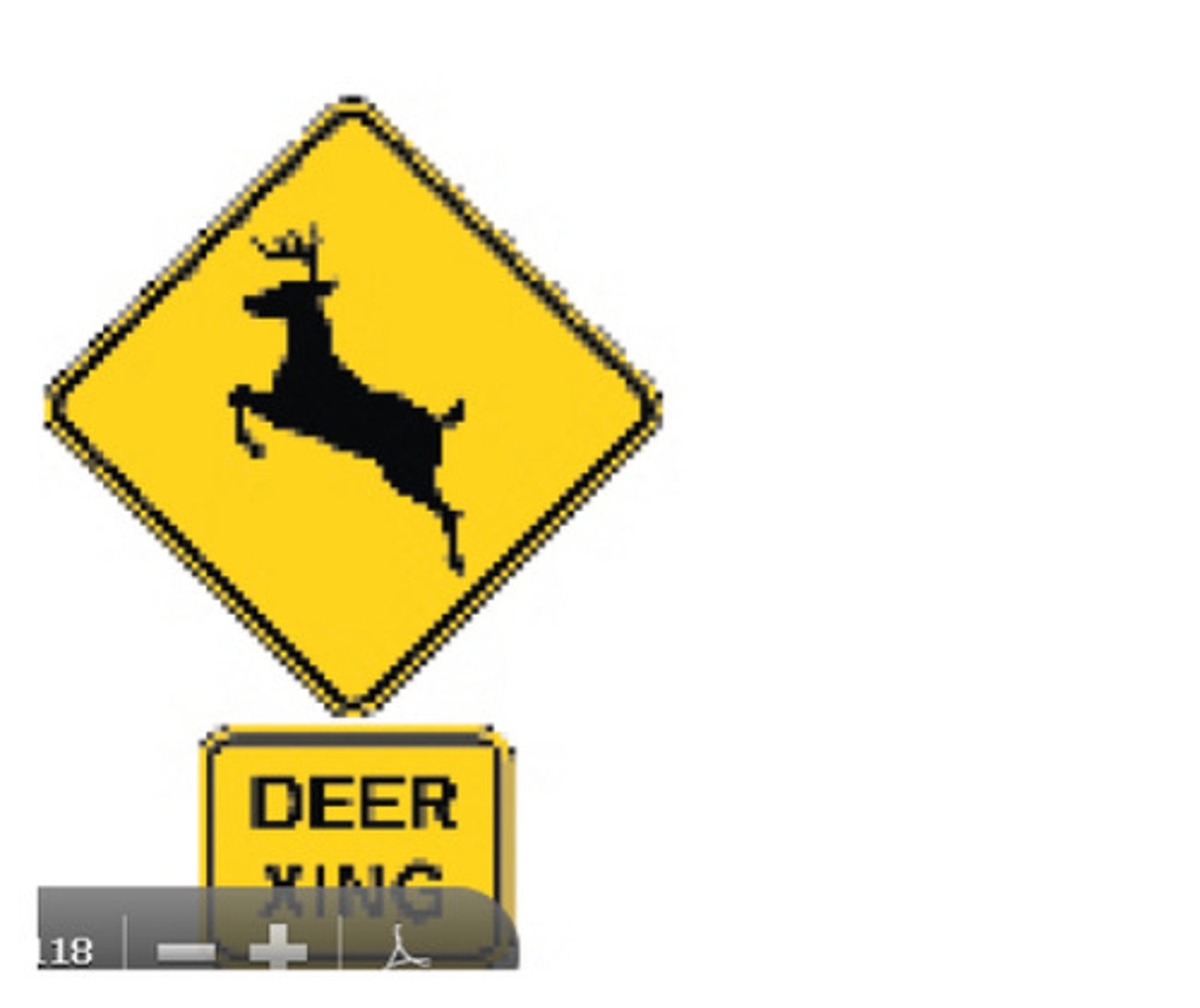
Scanning (Visual Search)
Keep your eyes moving, know what is ahead 10-15 seconds, and keep a safe distance around your vehicle providing you time stop or maneuver if necessary
Take in Whole Scene (Visual Search, 3)
-Use mirrors or look over shoulder to know what's behind and beside you every 2-5 secs, being alert of vehicles, bicyclist, motorcyclists
-Be aware of signs warning of problems ahead, giving directions
-Be prepared for rapid change in road conditions, traffic flow, and merging vehicles
Tailgater Rules (3)
-Use 3 second rule
-If tailgater is behind you, slow down gradually and shift lanes
-Careful on slippery roads with motorcyclists, towing vehicles, and buses at railroad crossings
Stopping Statistics
-At 55 mph, it takes 400 ft
-At 35 mph, it takes about 210 ft
-
Solid Yellow Line
"Do Not Pass If the Solid is on Your Side". Marks the road for two-way traffic
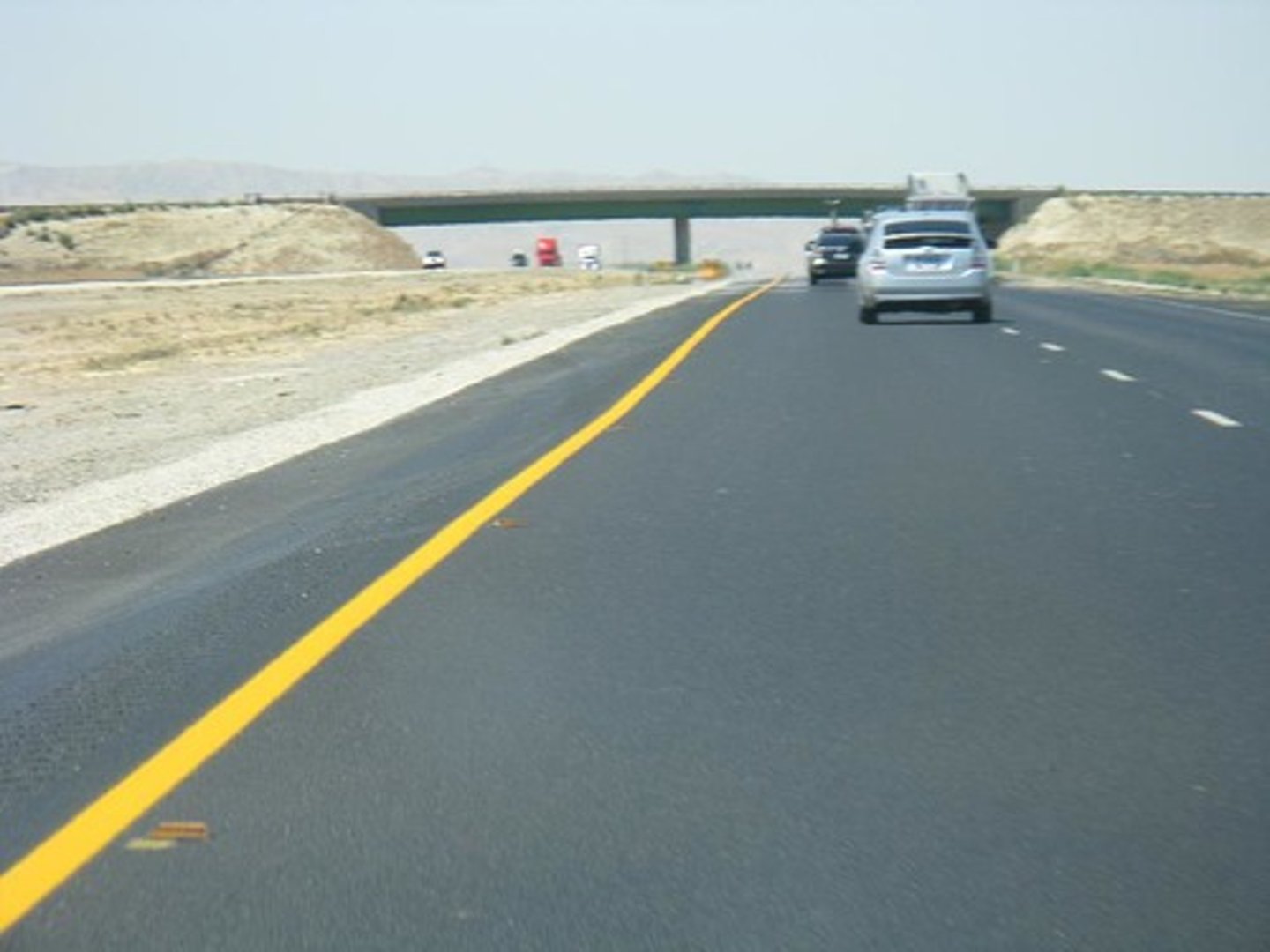
Broken Yellow Line
"May Pass if line is on your side and Movement Made Safely"
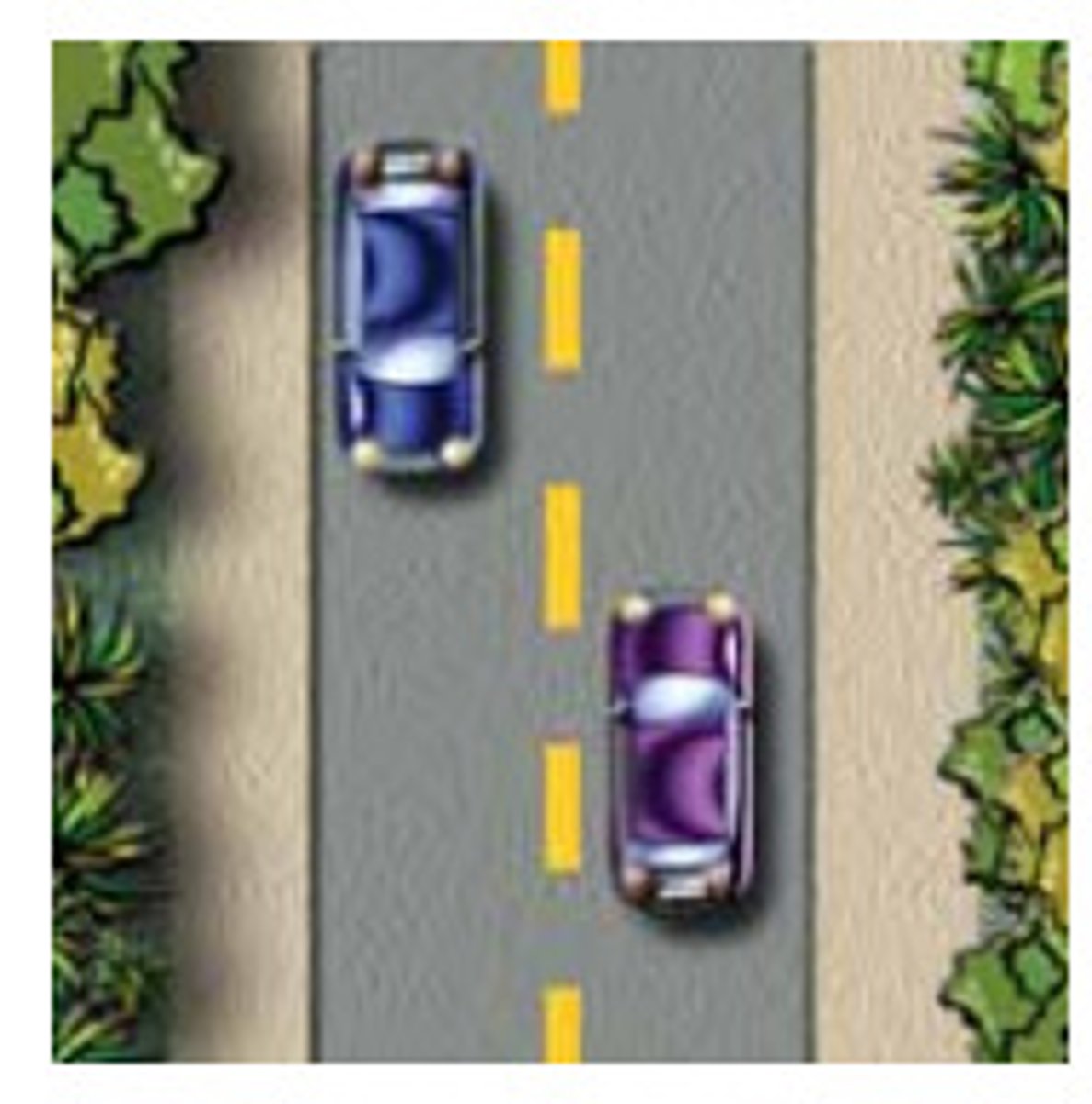
Two Solid Yellow Lines (3)
"Do Not Pass" unless
-In a carpool lane/High Occupancy Vehicle that has a designated entrance on levt
-Instructed by construction/signs
-To tur-n left into/out of driveway, private street, or U-turn
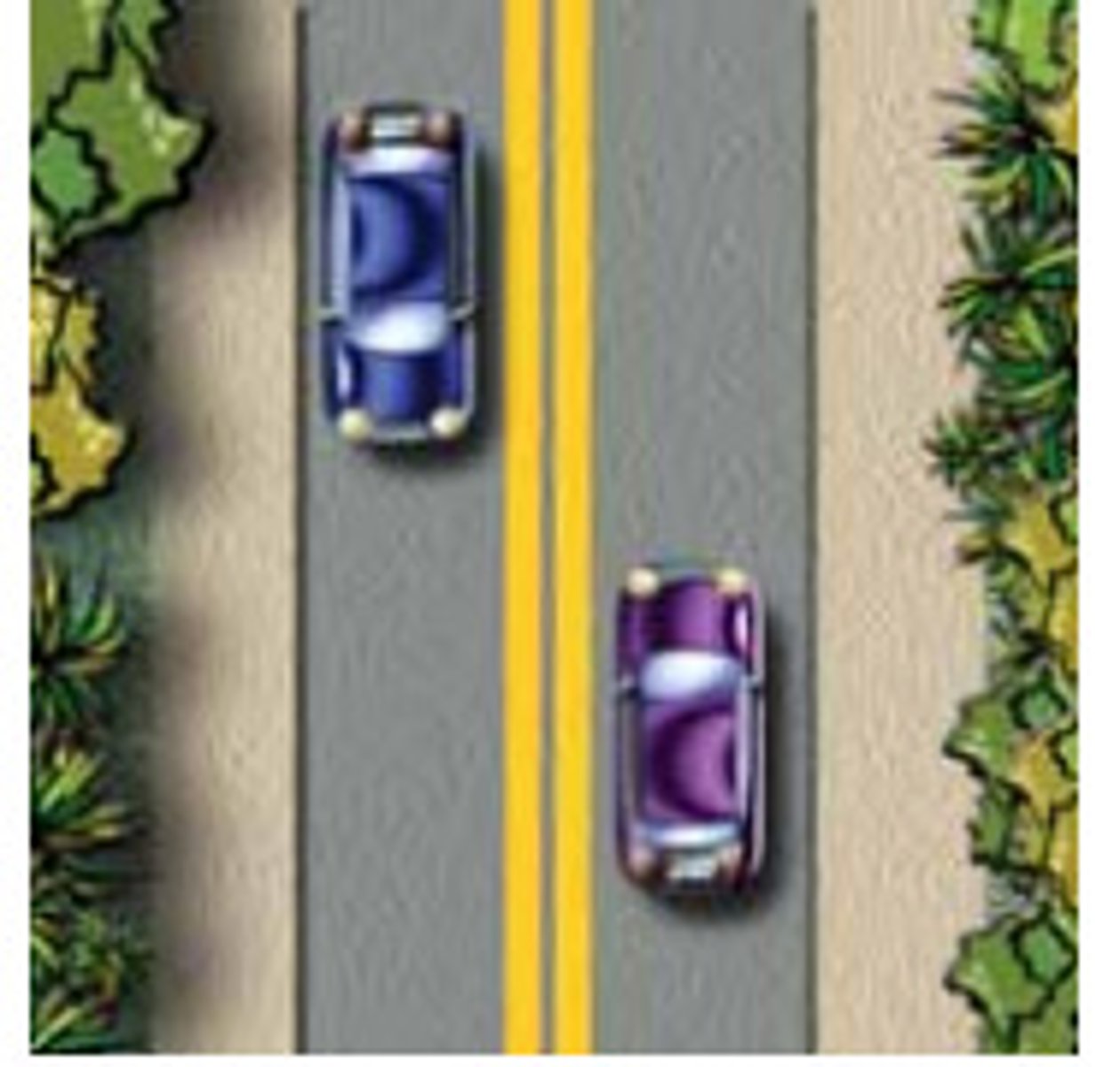
Two Sets of Solid Double Yellow Lines
Spaced 2 feet or more is considered a barrier. No crossing at all unless provided openings